




Each day, the San Diego Community College District touches the lives of tens of thousands of students and employees across the San Diego region. As San Diego’s largest institution of higher education, the District is singularly committed to creating equitable outcomes for its students while providing well-trained graduates needed by local employers.
Given this focus, it should be no surprise that a recent survey showed that San Diego voters strongly support the District, as well as San Diego City, Mesa, Miramar, and Continuing Education colleges. In addition to giving each of these institutions high marks, voters believe the District has a need for additional funding to ensure it can continue to provide all students with an equitable and inclusive learning environment.
To illustrate some of the important ways the District is moving towards this goal, we have created a board game that includes several key initiatives. Many of these initiatives are the result of the District’s recent strategic planning process. Others have been underway for years and are now paying dividends. In board games, as in real life, not every move is forward. Sometimes it is necessary to take a step or two backward in order to proceed. With skill and determination, however, progress is undeniable.
Thank you for joining us on this important journey!
A fresh group of leaders is driving progress and change across the District. Nine members of the 13-person Chancellor’s Cabinet were hired in the past three years, with two college presidents and three vice chancellors coming aboard in just the last year. Each is deeply committed to achieving equitable outcomes and there is a renewed sense of unity amongst the District’s executive leadership team. What’s the next big thing coming to the District? That remains to be seen, but the Cabinet will likely be in the middle of those efforts, working collaboratively to achieve a shared vision.
All three of the credit colleges are now designated as MinorityServing Institutions and recipients of U.S. Department of Education funding. This includes both Hispanic-Serving Institution grants and Asian American and Native American Pacific Islander-Serving Institution grants. HSI institutions (City, Mesa, and Miramar colleges) have at least 25% Hispanic enrollment. AANAPISI colleges (City and Mesa colleges) have an enrollment makeup of 10% Asian American or Native American Pacific Islander. While not eligible for federal funding, College of Continuing Education remains one of the most diverse institutions in California.
SDCCD’s four colleges are more vibrant as students continue return to in-person classes and activities. This will be helpful to each college’s efforts to build community and provide students with the services they need to be successful.
City, Mesa, and Miramar college enrollment was collectively up 4% (compared to spring 2022) for full-time equivalent students while College of Continuing Education was up 22% in enrollment.
More than 5,500 classes with free or low-cost textbooks are offered at the district’s four colleges. In 2022-23 alone, SDCCD students were able to save over $3 million in educational costs.
In the past year, the SDCCD has received a number of grants spearheaded by local representatives. Rep. Scott Peters awarded a Community Project Funding grant totaling $975,000 to expand districtwide programs for zero-textbook-cost courses using digital materials that are free to students. Assemblymember Brian Maienschein showed support of Miramar College’s student military population by advocating for a $2.5 million grant from the state of California to upgrade the campus Veterans Resource Center. Reps. Sara Jacobs, Scott Peters, and Juan Vargas secured $3.4 million in funding from the U.S. Congress to better serve LGBTQIA+, former foster youth, and undocumented students throughout the District.
Thanks to an increase in state and federal funding, plus private philanthropy, now more than ever, students throughout the District are free to be their true selves thanks to campus spaces created for them. This includes centers for the LGBTQIA+ community, veterans, Dreamers, former foster youth, and basic needs centers that provide students access to free food and clothing, and more.
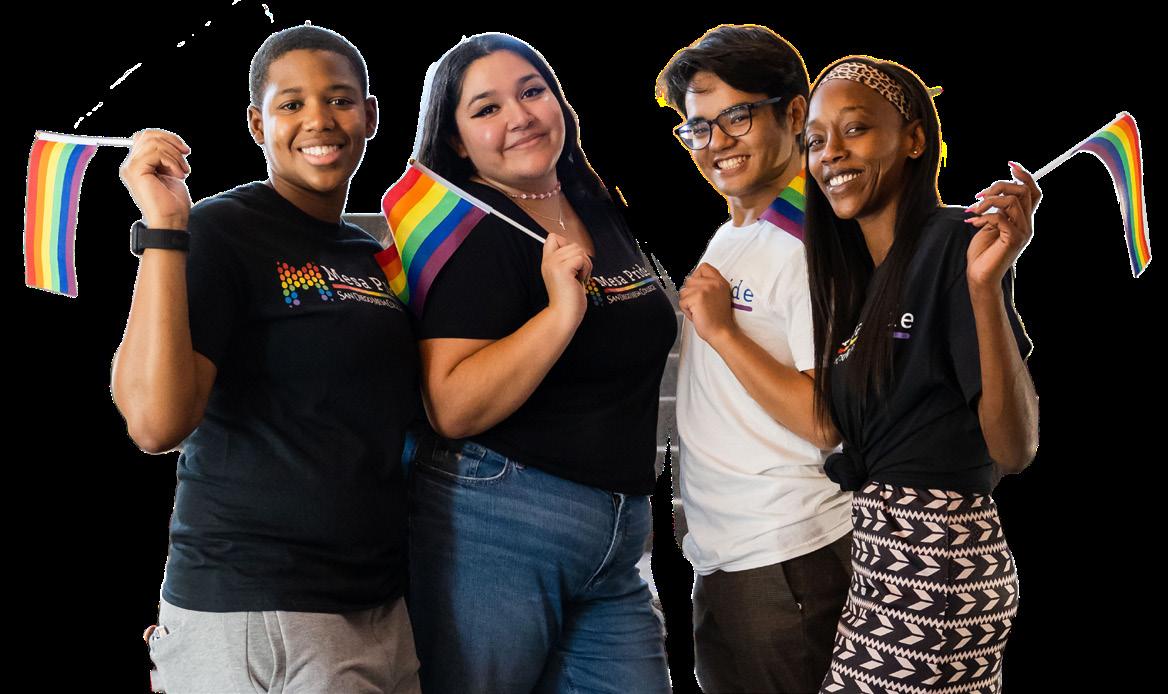


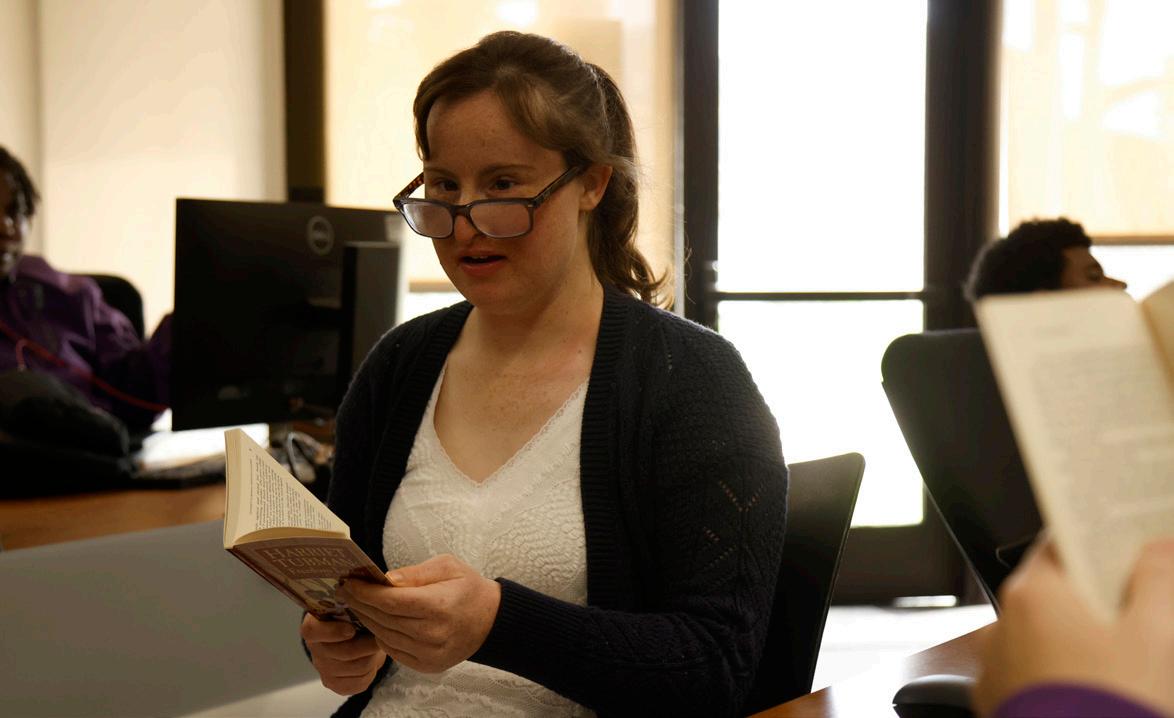

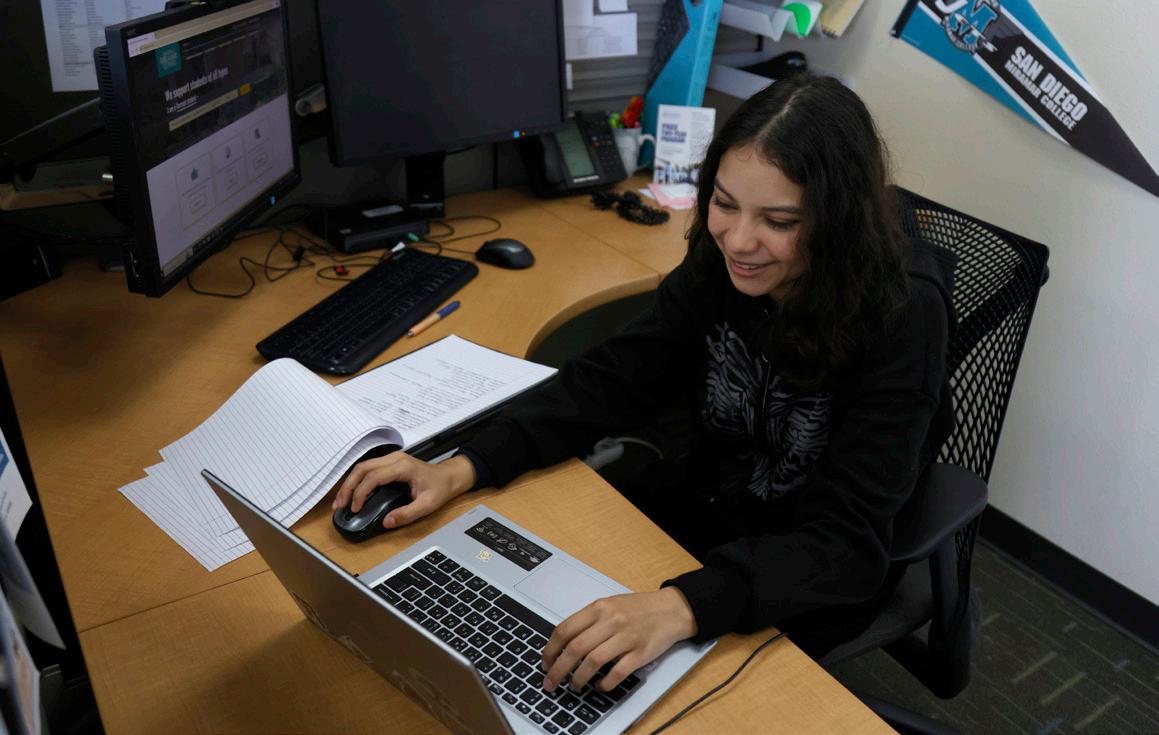

Student Trustees Diego Bethea, Phoebe Truong, Allen Kuo, and Julia Kogan can now add state and federal advocacy to their résumés thanks to back-to-back trips to Sacramento and Washington, D.C., at the start of 2023.
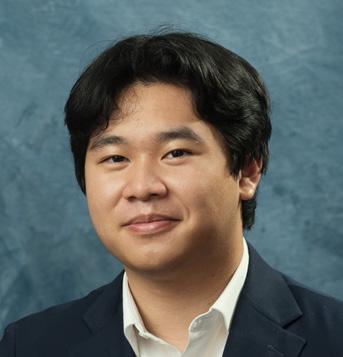
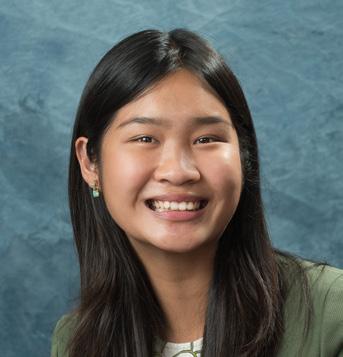
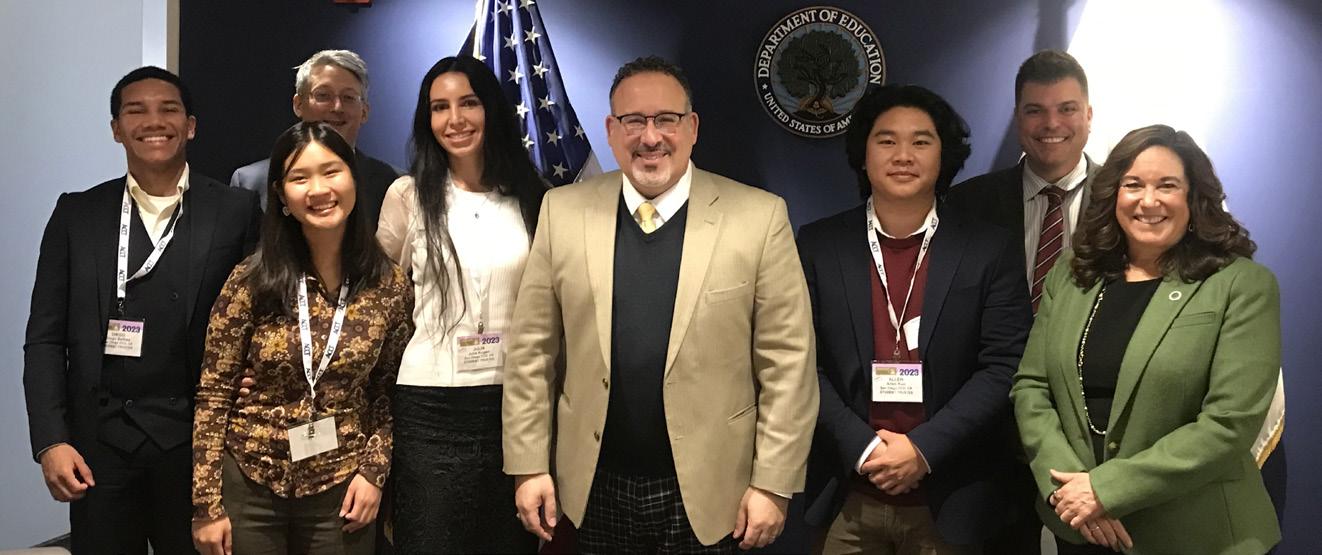
The San Diego Community College District, through its Board of Trustees, Chancellor’s Cabinet, and Student Trustees, attended the Community College League of California 2023 Annual Legislative Conference from January 29-30, 2023, in Sacramento and the Association of Community College Trustees National Legislative Summit from February 5-8, 2023, in Washington, D.C.
While in Sacramento, the student trustees participated in meetings with state leaders including Assemblymembers Akilah Weber, David Alvarez, and Tasha Boerner Horvath, among others. While on Capitol Hill, the student trustees met face-toface with Representatives Sara Jacobs, Scott Peters, and Juan Vargas, United States Under Secretary of Education James Kvaal, Secretary of Education Miguel Cardona, and United States Deputy Secretary of Education Cindy Marten — a San Diego Mesa College alumna.
“One of the things I admired most about these meetings with our legislators, as well as the conference, was the emphasis on the student voice,” said Dean of Outreach and Student Affairs Luke Menchaca.
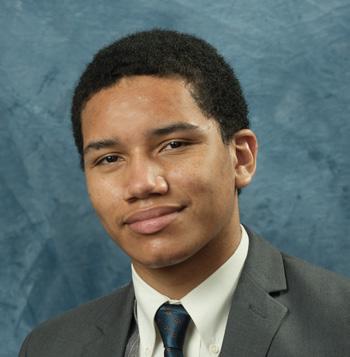
During the March 23 Board Meeting, all of the student trustees expressed their gratitude to the Board of Trustees, Chancellor Carlos O. Cortez, and others who helped organize the trips, while also sharing their personal takeaways from the experiences.
Student Trustees Julia Kogan, Phoebe Truong, Allen Kuo, and Diego Bethea in front of the U.S. Capitol during their February advocacy trip to Washington, D.C.
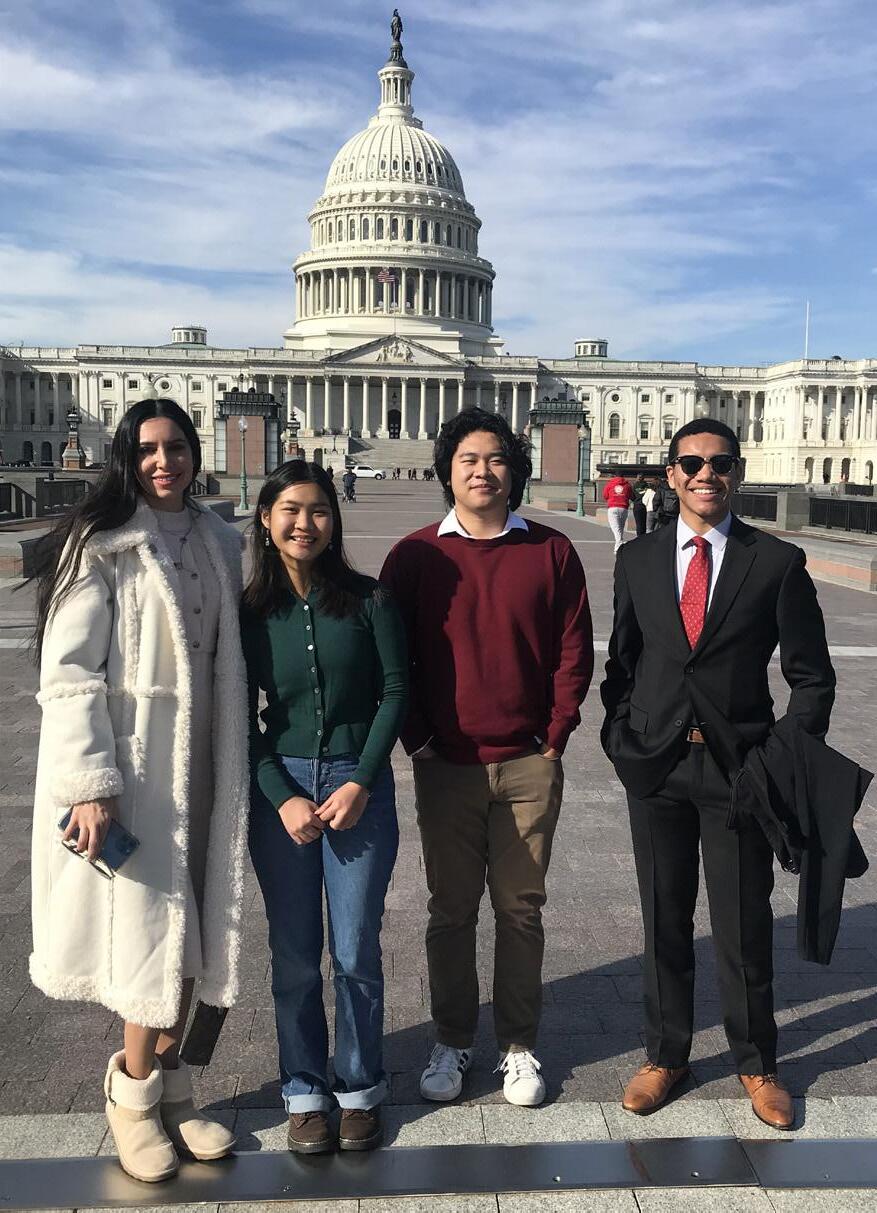
“As Aaron Burr says in the play ‘Hamilton’, ʽto be in the room where it happens’ ― I’m at a loss for words. To shake the hands of our representatives ― our state assemblymembers and senators ― I definitely won’t forget this opportunity.”
“As the daughter of immigrants who came here to give me a better future, I never imagined I would have this opportunity to be in D.C. and Sacramento advocating for students like myself. An experience that stood out to me was hearing Sara Jacobs’ story and hearing her say, ‘Eventually someone told me if I wanted to see a young woman in politics, I would have to do it myself.’ Hearing this made me feel like change is something you do, not just watch. This experience changed my life.”
“Moving forward this would be a really good experience for future student trustees. It was really when we were in D.C. talking to legislators and looking them in the eye that it seemed that they were really engaged in the conversation and listening to what we had to say. It made me realize that it is possible for us to make change on a greater scale.”
“I traveled with a sense of responsibility to represent my college and District in the best possible way. In reality, it exceeded my expectations. I learned how to build strong relationships; I got great experience and skills in communication. We have learned how to work even better as a team as student trustees. I was able to share my story as an immigrant student and show what needs my college has today.”
Alphonso Brown didn’t start out looking for a career in information technology or cybersecurity. “I graduated with a bachelor’s degree in political science with a minor in criminal justice,” Brown said. That, however, was nearly three decades ago. Now, he is a cybersecurity expert, Department of Defense contractor, president of ALCA IT Solutions, Inc., and an adjunct professor at San Diego College of Continuing Education’s North City campus. At the North City campus, Brown’s specialty is teaching how to design layered security architecture that can be analyzed for flaws, while also preparing them for CompTIA Cybersecurity Analyst (CySA+) certification.
The Murrieta resident and St. Petersburg, Florida, native served in the Navy Reserve for more than 21 years before recently retiring as a Petty Officer 1st Class. His civilian career includes designing a software system for a Florida-based insurance company and working as a cybersecurity analyst at companies such as Hewlett Packard Enterprise and Lockheed Martin.
WE recently spoke to Professor Brown about his role as an IT instructor at College of Continuing Education and his impact on the future of the growing cybersecurity workforce.
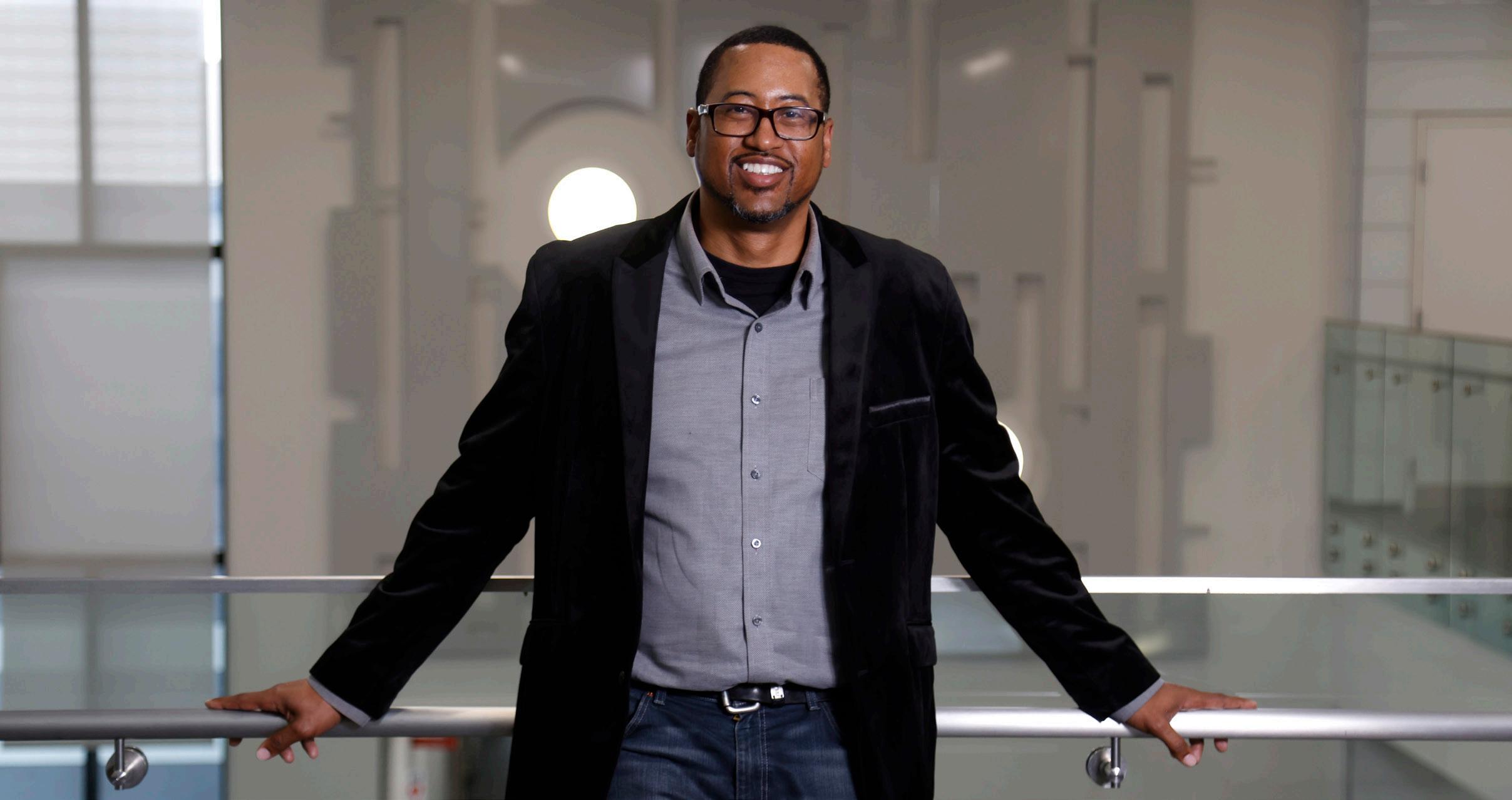
Can you share your thoughts about the growing demand for and importance of cybersecurity professionals?
Every industry, from banking to healthcare and everything in between, utilizes information systems to allow organizations to create, manage, and store data pertaining to their industry. Cybersecurity tools and specialists are used to create systems, processes, and policies that are designed to protect that data. Over the last 20 to 30 years, information systems have become vital to the operation of every organization, and the need for professionals who are specialized in protecting the data produced, stored, and transmitted will only continue to grow.
What makes SDCCE’s program so unique?
It provides cybersecurity training that is current and free, and it covers skills and concepts that can be applied to industry careers that students currently have or are aspiring to begin. Students learn the basics of cybersecurity architecture and tools to protect a network from hackers. They learn to use tools and guidelines to build security policies and procedures, to design layered security architecture and analyze it for flaws, and to use industry standards for software security. How would you describe your students? Our students come from every walk of life.
Ages 18 to 75, they have differing aspirations as to what they want to do with this knowledge. However, to enroll, you must have work experience or educational background in software, hardware, and networking. This is a next step in taking their knowledge in those topics and applying cybersecurity concepts to be able to protect the data created, stored, or transmitted on information systems.
Why should students enroll in SDCCE’s cybersecurity program?
Students who are ready to grow to that next level and who desire to increase their knowledge while making themselves more marketable should enroll in this program. The networking that I highly encourage students to do while in class and the opportunities brought by our guest speakers help students to understand the cybersecurity market and what the industry is looking for in cybersecurity professionals.
What is the best part about teaching at College of Continuing Education?
The people who I get to interact with, whether they are staff or students. To be able to work with such a diverse group of professionals and students helps me to keep the fire burning to continue to grow and learn.



Alittle rain didn’t stop nearly 300 San Diego Community College District participants from celebrating the legacy of Dr. Martin Luther King, Jr. during the 41st annual parade along the San Diego waterfront. The District’s two float entries, one representing San Diego City, Mesa, and Miramar colleges, another for San Diego College of Continuing Education, secured awards.
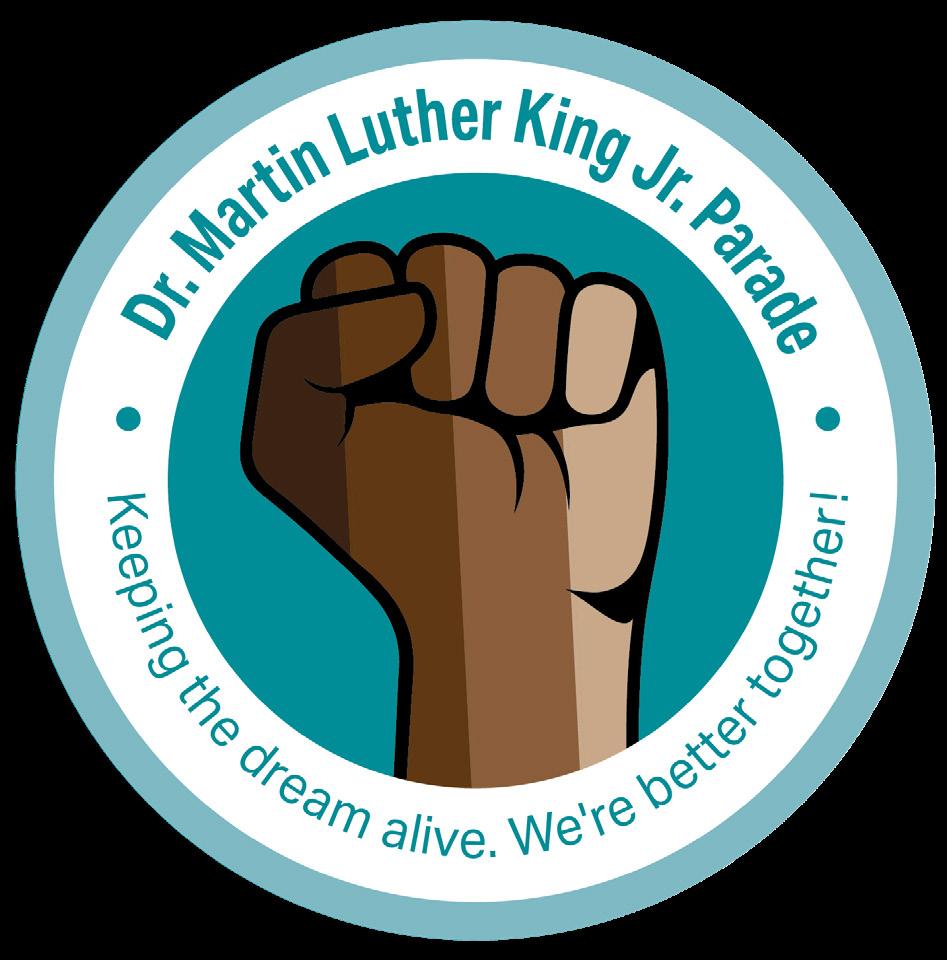

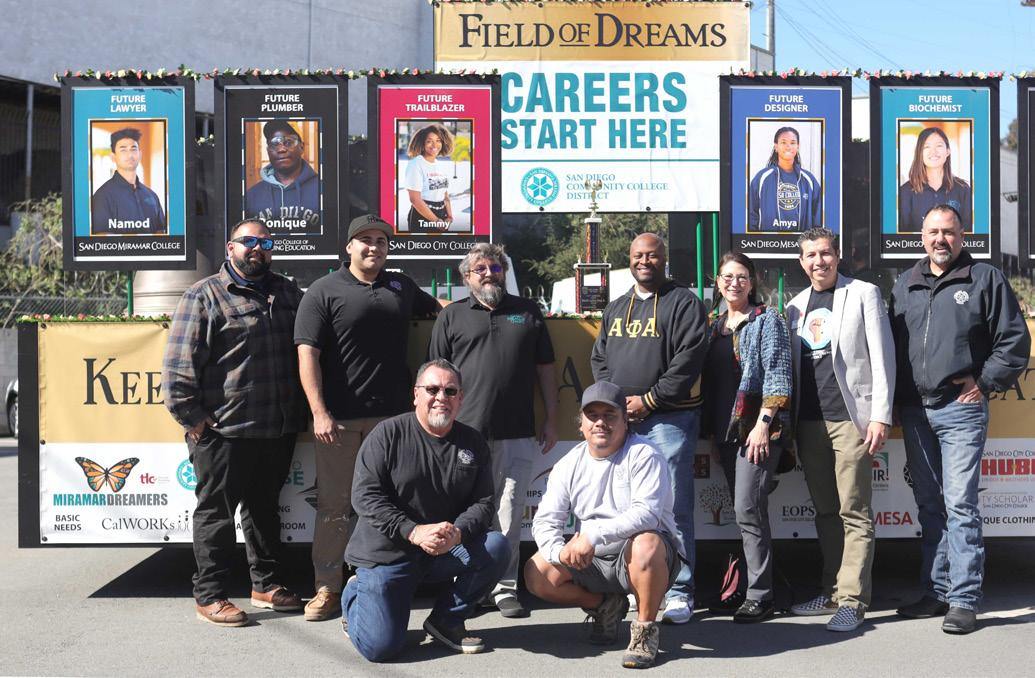

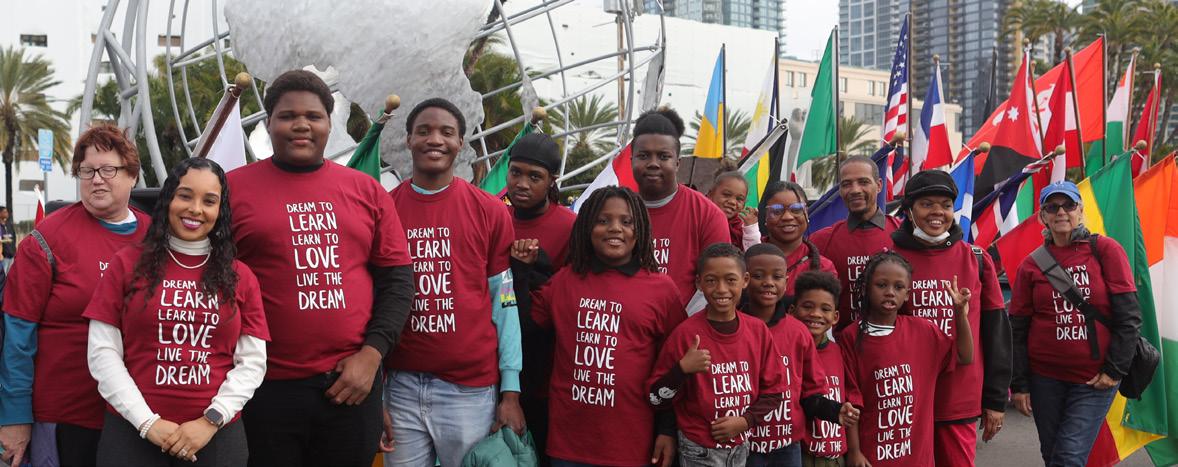
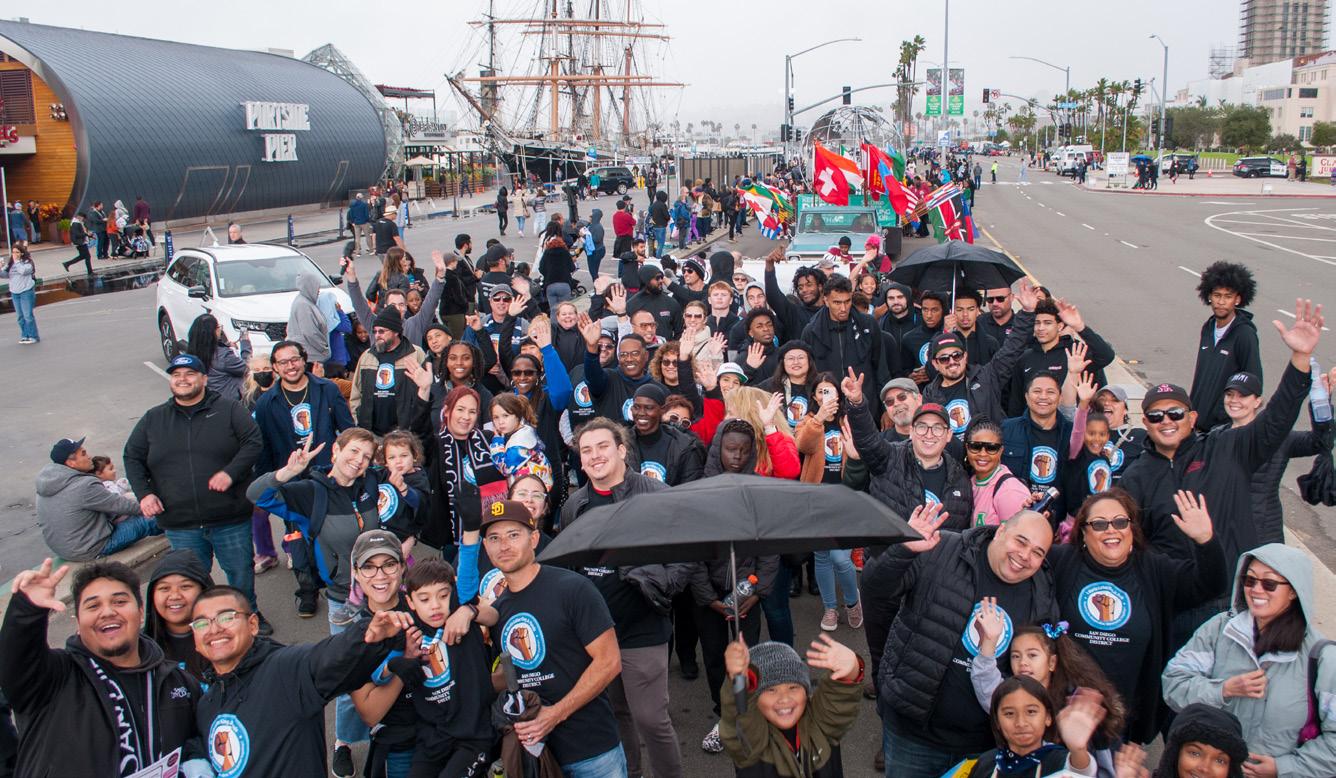


San Diego City College’s award-winning Graphic Design program has been ranked as the top educational program of its kind in the world by the London-based graphic design industry nonprofit World Brand Design Society. City College was the only community college on the organization’s global ranking lists for 2022-2023.
“This says a lot about our faculty, our students, our mentorship, and our approach we take toward education,” said graphic design Professor Sean Bacon, who also serves as co-chair of the City College Visual and Performing Arts Department. “This truly is an outstanding program.” City College amassed 17 awards at the World Brand Design Society competitions, and two students earned scholarships for their showings.
“The work highlights the students’ ambitions and the institution’s exceptional quality of teaching,” the World Brand Design Society wrote on its website. “A big congratulations to the dedicated educators like

Professor Sean Bacon and SDCC Faculty team.”
Students also captured 19 of the 21 awards in the student category during the 2022 awards competition hosted by The One Club for Creativity – San Diego.

The City College graphic design program has an enrollment of about 1,600. Students can earn a certificate of achievement or associate degree in graphic design.
Members of San Diego’s congressional delegation, including Rep. Sara Jacobs, Rep. Scott Peters, and Rep. Juan Vargas, presented the San Diego Community College District with a check for $3.4 million in funding from the U.S. Congress during a March 6 event held at San Diego Mesa College.
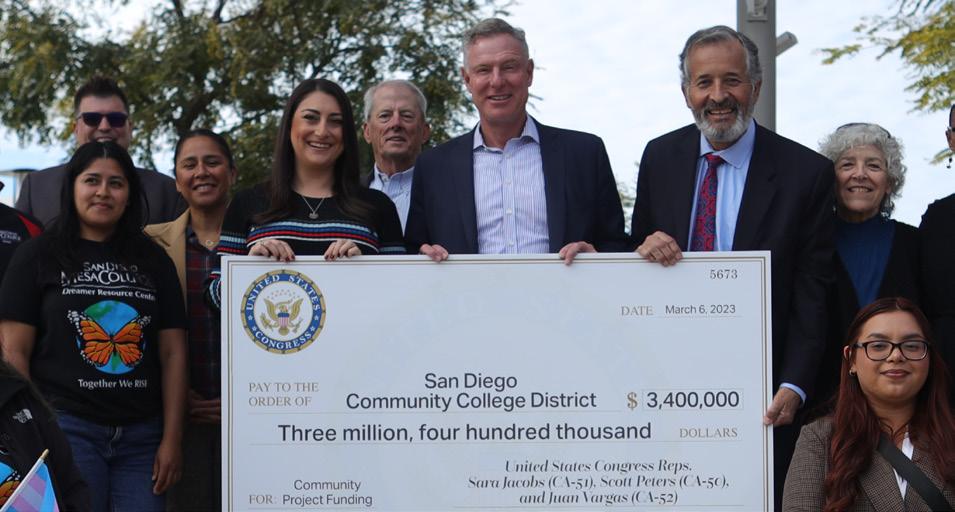
The funding, approved in December 2022 as part of the fiscal year 2023 Omnibus Appropriations Bill, will benefit the District’s students in three areas.
Rep. Jacobs obtained $1.2 million to better serve lesbian, gay, and transgender students.
“LGBTQIA+ youth should be focused on living their lives, but instead many are dealing with mental health issues resulting from the rise of anti-LGBTQIA+ rhetoric, policies, and violence,”
said Rep. Sara Jacobs, Vice Chair of the Congressional Equality Caucus and Co-Chair of the Transgender Equality Task Force.
A $1 million grant backed by Rep. Peters will fund the Gateway to College and Career Program at San Diego College of Continuing Education for former foster care youth. Studies show that 47% of youths who have just aged out of foster care are unemployed, and
33% are or have been unhoused. More than 1,500 former foster care youths live in San Diego County.
“Community colleges are an integral part of our region’s educational landscape,” said Rep. Peters. “I look forward to seeing the success of the Gateway to College and Career Program for years to come.”
A $1.2 million grant sponsored
by Rep. Vargas will support Dreamer Resource Centers at the four colleges. The centers serve undocumented students, including Deferred Action for Childhood Arrival (DACA) students, by offering help with registering for classes, financial aid, and readiness for college and a career.
An estimated 1,200 undocumented students attend City, Mesa and Miramar colleges. An additional 2,000 students who are undocumented or come from families with undocumented members attend the non-credit San Diego College of Continuing Education.
“Dreamers and undocumented students deserve a fair shot at the American Dream like everyone else, and the great equalizer is a high-quality education,” said Congressman Juan Vargas.
Renda has found a way to change the drinking game forever. Thanks to his invention of the “WesCup,” childhood dreams of being able to enjoy multiple drink flavors at one time is now possible with a unique three-inone cup design. The cups are being sold at more than 30 7-Eleven stores around San Diego.

Renda thought of this creative idea at the age of 11 during a road trip to Disneyland where he quickly tired of having to finish a 48-ounce drink with just one flavor, saying that people could get bored with it.
The WesCup, which sells for $4.99, has many features, including clear plastic that showcases the customer’s choices in drinks and is dishwasher safe. Renda says the cups, which boast the tagline “3 Drinks. 1 Cup,” are a great fit for businesses such as airports, hotels, movie theaters, theme parks, and more. Additionally, customers can customize the cup by adding tailored logos or graphics.
Renda has been a Mesa College student since he was 16 as a dual-enrolled high school student, and he will graduate this spring at the age of 19. Learn more about his invention at wescup.com.
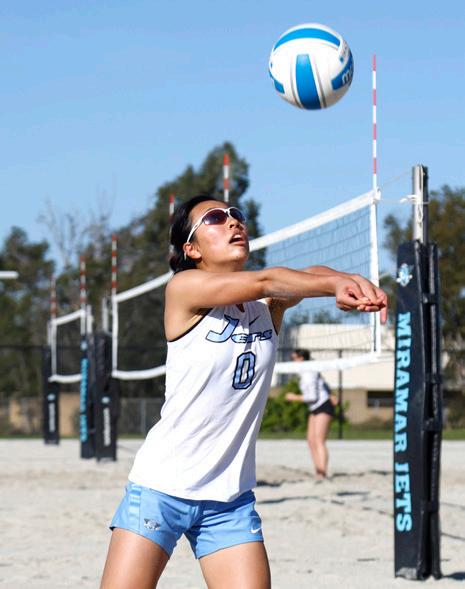
The San Diego Miramar College women’s beach volleyball team kicked off its inaugural season on February 10, with the 15-member team’s first home match on a new on-campus, four-court outdoor sand facility on March 3. Miramar College joins five area colleges (San Diego City and Mesa colleges, Grossmont College, Palomar College, and MiraCosta College) to be among the 36 beach volleyball teams participating in the California Community College Athletic Association. Nancy Ros, the women’s volleyball coach, was tapped as the inaugural beach volleyball coach, as well.
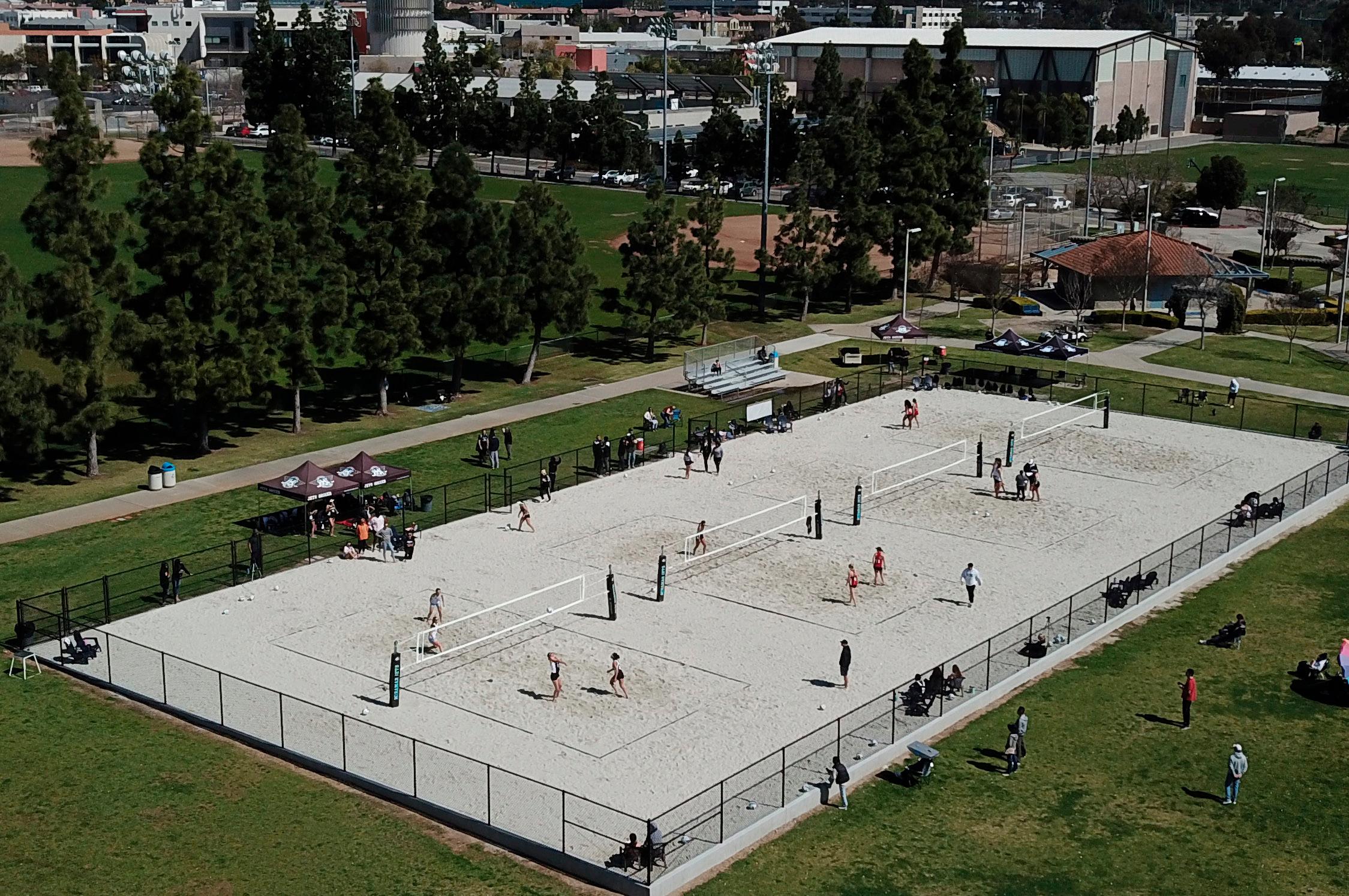


For Natalie Jackson, receiving her education has never been more gratifying. Jackson, a student at San Diego College of Continuing Education, has Down syndrome, an intellectual disability which makes learning more challenging. However, thanks to the support she has received through Disability Support Programs and Services, she now knows that continuing her education and studying culinary arts and musical theatre is possible.
“These services have really made a huge impact in my education,” Jackson said. “These services have made it easier for me to manage myself through reminders from my case worker and the support from my instructors and my peers.”
All four San Diego Community College District colleges — San Diego City, Mesa, Miramar, and Continuing Education — have their own DSPS offices where students can work with a counselor to determine what kind of services or accommodations are needed to help them reach their educational goals. Students are able to meet with counselors at least once a semester, and additional services offered to students include assistive technology, disability management, extended time on exams, priority registration, note-taking and test-taking strategies, textbooks in alternate formats, American Sign Language (ASL) interpreting services, speech to text captioning, and more.
The District is also a part of the San Diego and Imperial Counties Community Colleges Association, a regional consortium of colleges focused on sharing training resources and making assistive technology available to students more consistently from college to college.
Districtwide DSPS offerings are driven with one concept in mind: Disability is seen “as a vital dimension of diversity, and that it is a natural part of the human condition.” It is this inclusive orientation that draws students from throughout the region to the SDCCD.
“A student-centered approach and nurturing a sense of belonging are two important ways that the SDCCD
A student-centered approach and nurturing a sense of belonging are two important ways that the SDCCD DSPS shows its commitment to students.”
― POPPY FITCH, dean of Wellness and Disability Support Programs and Services
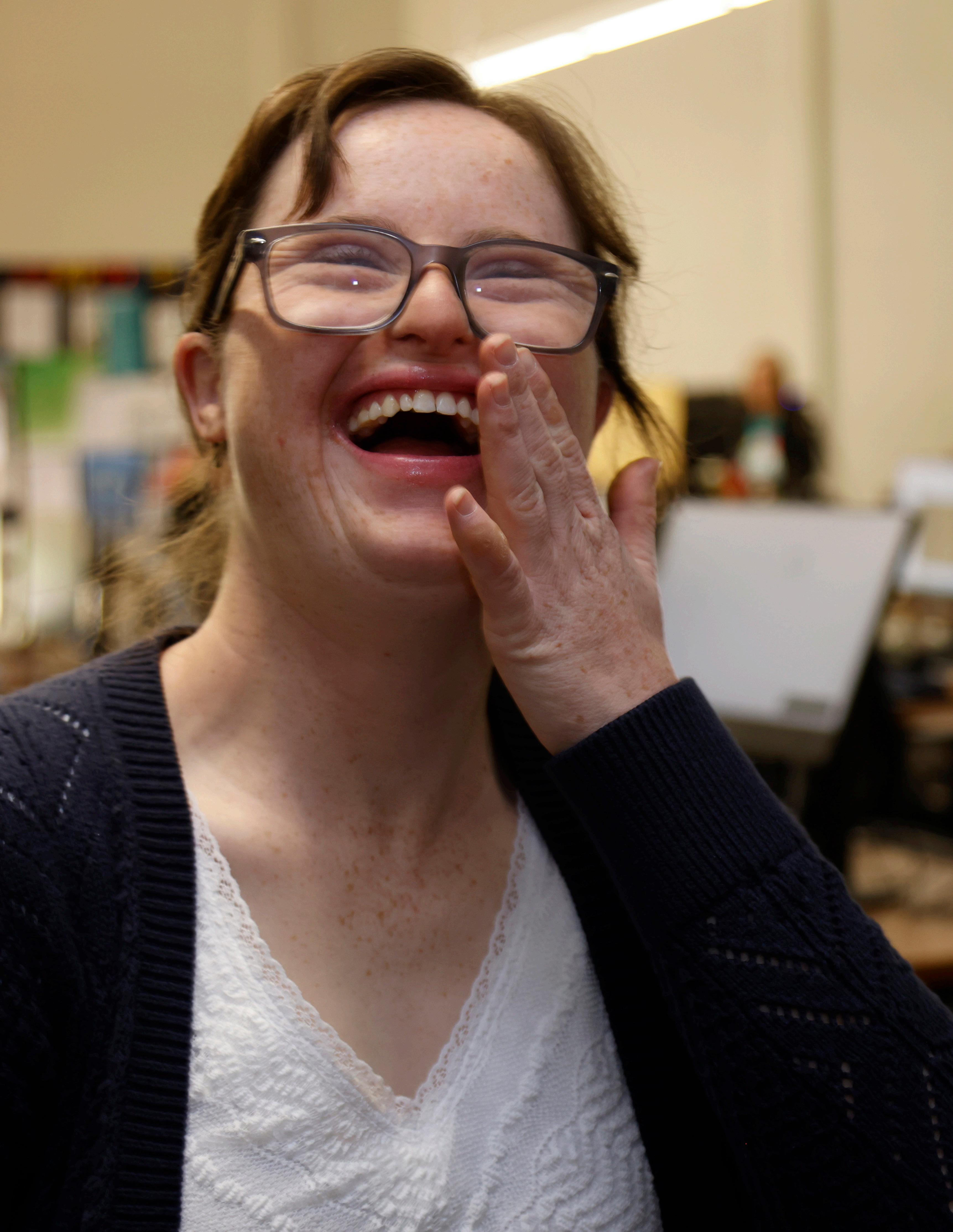

DSPS shows its commitment to students,” said Poppy Fitch, dean of Wellness and Disability Support Programs and Services at SDCCD. “Students can expect that we will prioritize their goals and work closely with them to develop individualized accommodation plans that meet their specific needs and help them achieve academic success.”
The District DSPS provides services at events so students, staff, and visitors who are deaf or hard-of-hearing can equally enjoy them.
Although SDCCD offers a variety of services, it continues to evolve as new technology is released or as challenges, such as the COVID-19 pandemic, are presented. Fitch said “the very heart of the DSPS mission is flexibility.”
“Our work is about finding ways to ensure access and to support student equity by working with students individually to determine their unique strengths and their disability-related impacts in the learning environment,” said Fitch, who has served as the dean for more than three years.
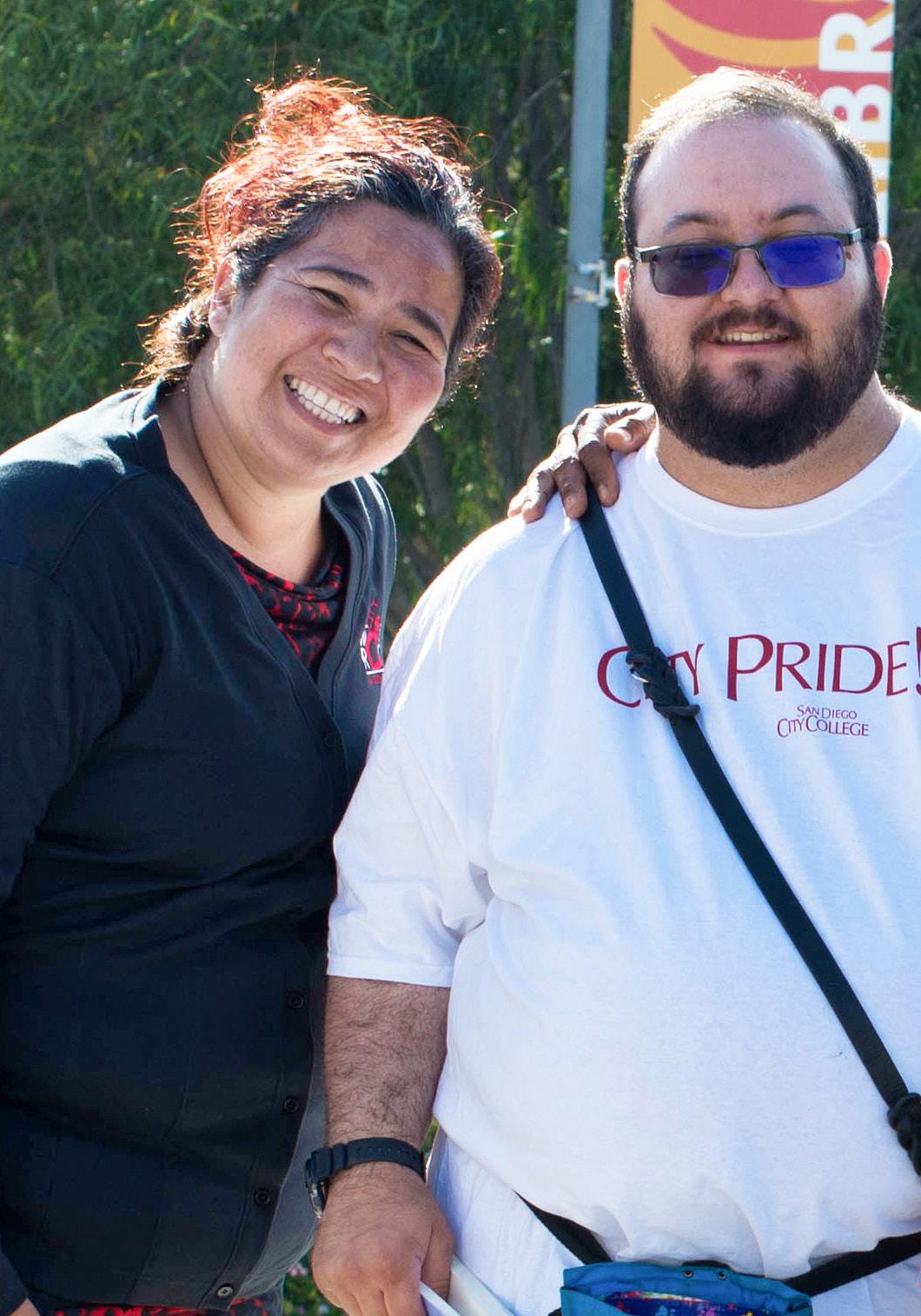
This was demonstrated when the pandemic unfolded, the colleges implemented changes to serve the students. Erika Higginbotham, DSPS coordinator at Mesa College and former assistive technology specialist, used her expertise to develop the faculty resource tool Accessibility of Distance Learning Courses for Students with Disabilities. Miramar College DSPS Coordinator Kandice Brandt, who is also an American Sign Language Interpreter, championed the procurement of Otter.ai, a technology that enables speechto-text in online and face-to-face environments.
“The evolution of technology has significantly benefited students needing accessibility services by providing them with greater opportunities to access educational resources, communicate with peers and teachers, and participate in academic activities,” Fitch said. “Some of the ways technology has benefited students with disabilities include assistive technology, online learning platforms, communication tools, and mobile devices.”
Led by Acting Dean of DSPS Katie Serbian, College of Continuing Education provides specialized course offerings to students with disabilities. For example, the Acquired Brain Injury program, which continued to provide a crucial service to students and the community throughout the pandemic.
Embracing technology and implementing effective change districtwide allowed students to learn even as they stayed home during the pandemic.
When it comes to ASL interpreting services, Daniel Nakaji, who has worked as the Interpreting Services Supervisor at the SDCCD since 2009, said remarkable progress in technology has been made over the last few years.
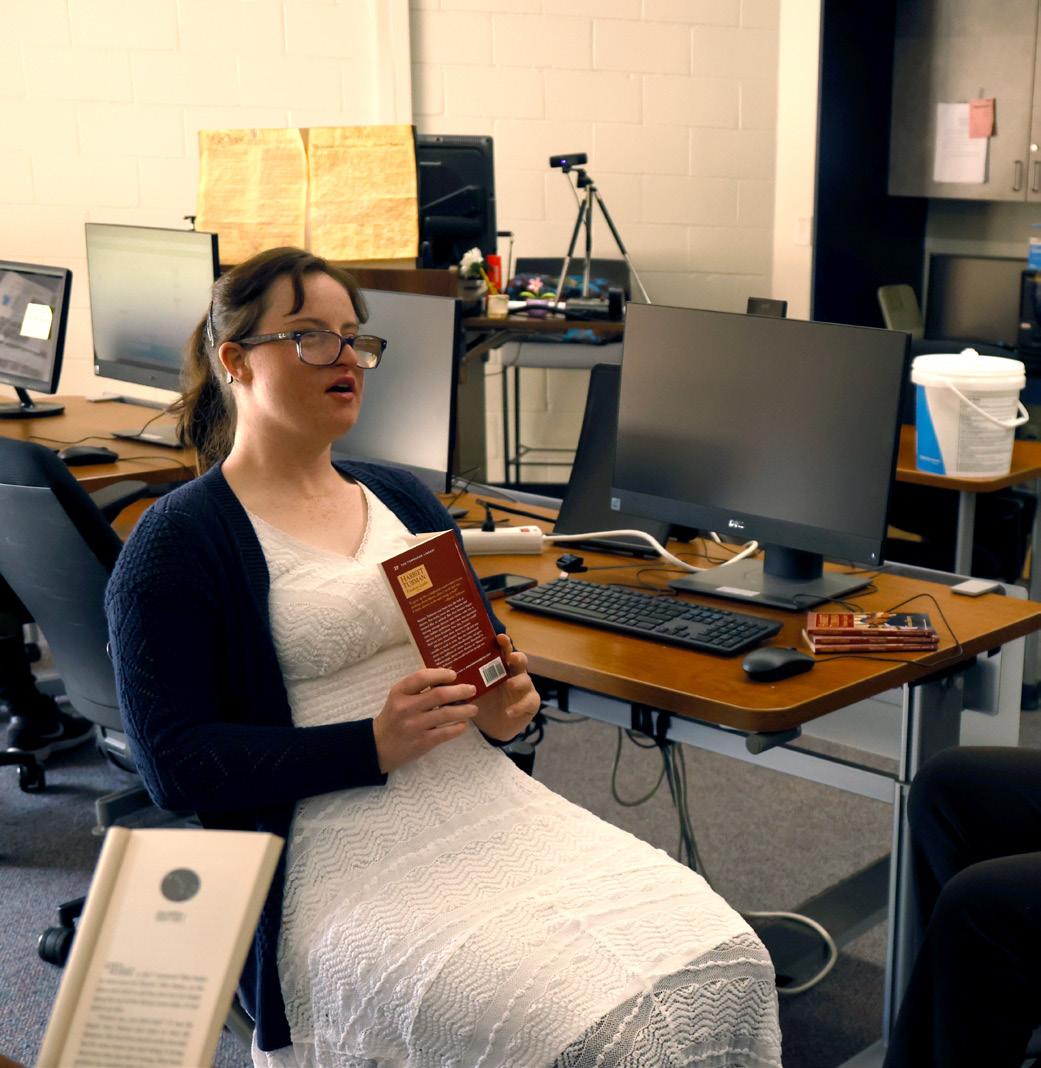
(Clockwisefromtop left)NatalieJackson participatesinabook discussionwithher peerswhileinstructor MarieDoerner (standing)watcheson. Asawaytoprovide accesstothosewho arehardofhearing, ASLinterpreters,like KennedyCooper (picturedonscreenin thebottomright corner),canbeseen atmanySanDiego CommunityCollege Districtevents, including commencement ceremonies.City Collegestudents strollaroundcampus withmembersofthe campusDSPSteam.



“With AI or machine-learning, the accuracy of speech recognition has made tremendous strides, such that some of our students are fine with using automated speech recognition as either their sole service for access or to supplement with their existing services,” Nakaji said.
Nakaji, who is himself deaf, said video conferencing platforms also now offer enhanced features that support those with disabilities, including better captioning support, live transcription, and other related features.
Despite the advances in technology, there are still challenges for students with disabilities. For example, limited accessibility of technology, the costs associated with assistive technology, technical challenges, and the digital divide all present obstacles, Fitch said.
“Not all technology is designed to be accessible to people with disabilities,” Fitch said. “This can limit their access to digital content and communication tools.”
Still, DSPS leaders are continually working to provide exceptional services to their students with disabilities.
“The DSPS leadership across the District collaborates closely with one another and with college faculty and classified professionals to ensure that accommodations are made and
implemented in a timely and effective manner,” said Fitch, who has been serving students with disabilities since 1990. “We collaborate with other student services departments to provide a seamless experience for students with disabilities.”
With that collaboration available, Nakaji said improved services are in the works. He said the District is working closely with the Mesa College ASL-English Interpretation Training Program so that the fieldwork students and graduates can start their professional career in the sign language interpreting field. He hopes these new students can address the shortage of interpreters.
“We are also working with our IT department to improve the WiFi access points at all campuses to support our technological solutions and accessibility services for our students,” Nakaji said. “We also provide an online learning opportunity for folks who may be interested in becoming a captioner.
“We strive to provide [students] with quality services and empower them to meet their education and career goals.”
The Future of DSPS and Advocacy Vinzent Balaoing, a student at College of
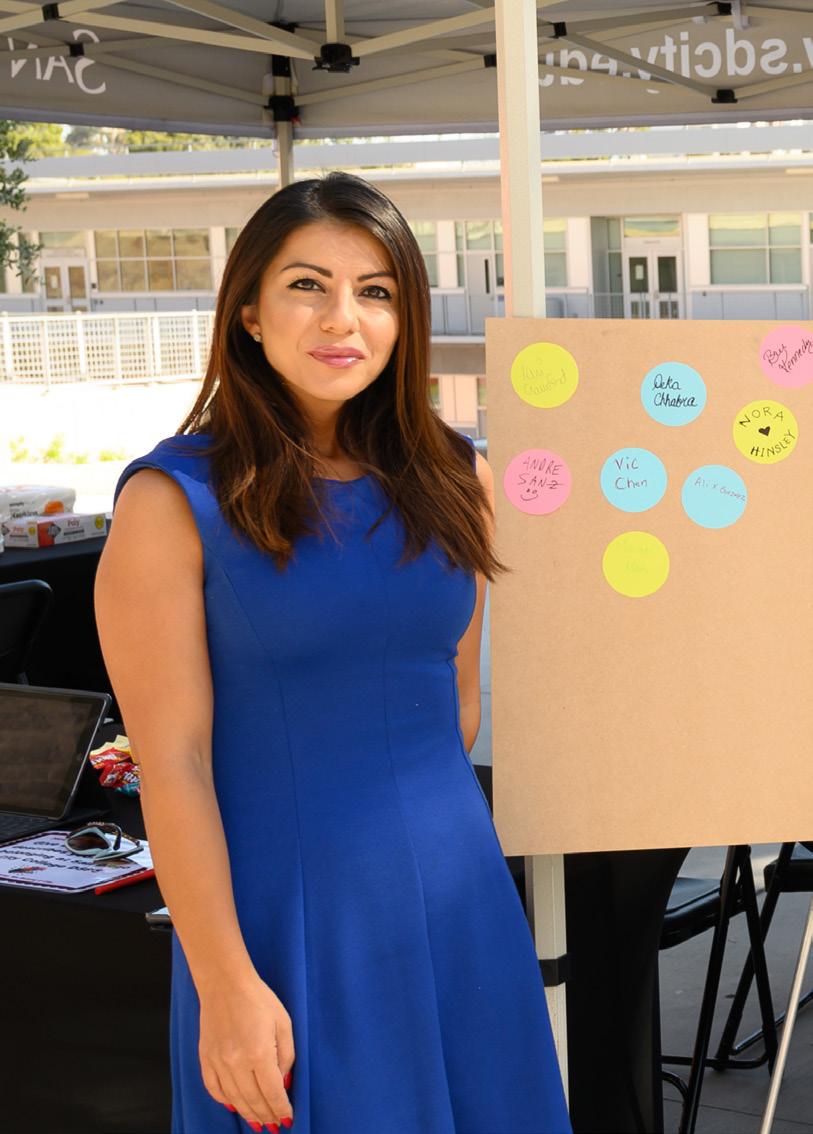
Continuing Education, said the support he has received through the DSPS program has done more than just help him earn an education. He said it has made him an advocate for those with disabilities.

Balaoing, who is partially blind, said he began taking classes at the college more than 10 years ago. Because of the services he received from the school, he is planning a future in film production and plans to transfer to City College to earn his degree.
“DSPS shows the community that the school really cares about their students who have disabilities,” he said. “It has opened up the world for students with disabilities through this program.”
Along with his studies, Balaoing also became involved in the District community and now serves as a student representative for San Diego College of Continuing Education Foundation’s Board of Directors.
“Through advocacy and accommodations, students with disabilities can learn in many ways,” Balaoing said. “It has encouraged me to now fight for students with disabilities and educate others on their rights. I am proud to now be an advocate.”
Increasing collaboration toward greater acces-
sibility is one of the many ways that DSPS advocates for access and equity for students with disabilities. In a partnership between Instruction, Online Learning Pathways, and DSPS, online accessibility mentors are situated at each college to support faculty in learning about and implementing accessibility within their online classrooms.
Johanna Gleason, an online accessibility mentor at College of Continuing Education since 2022, said informing students of their rights is a top priority at the District.
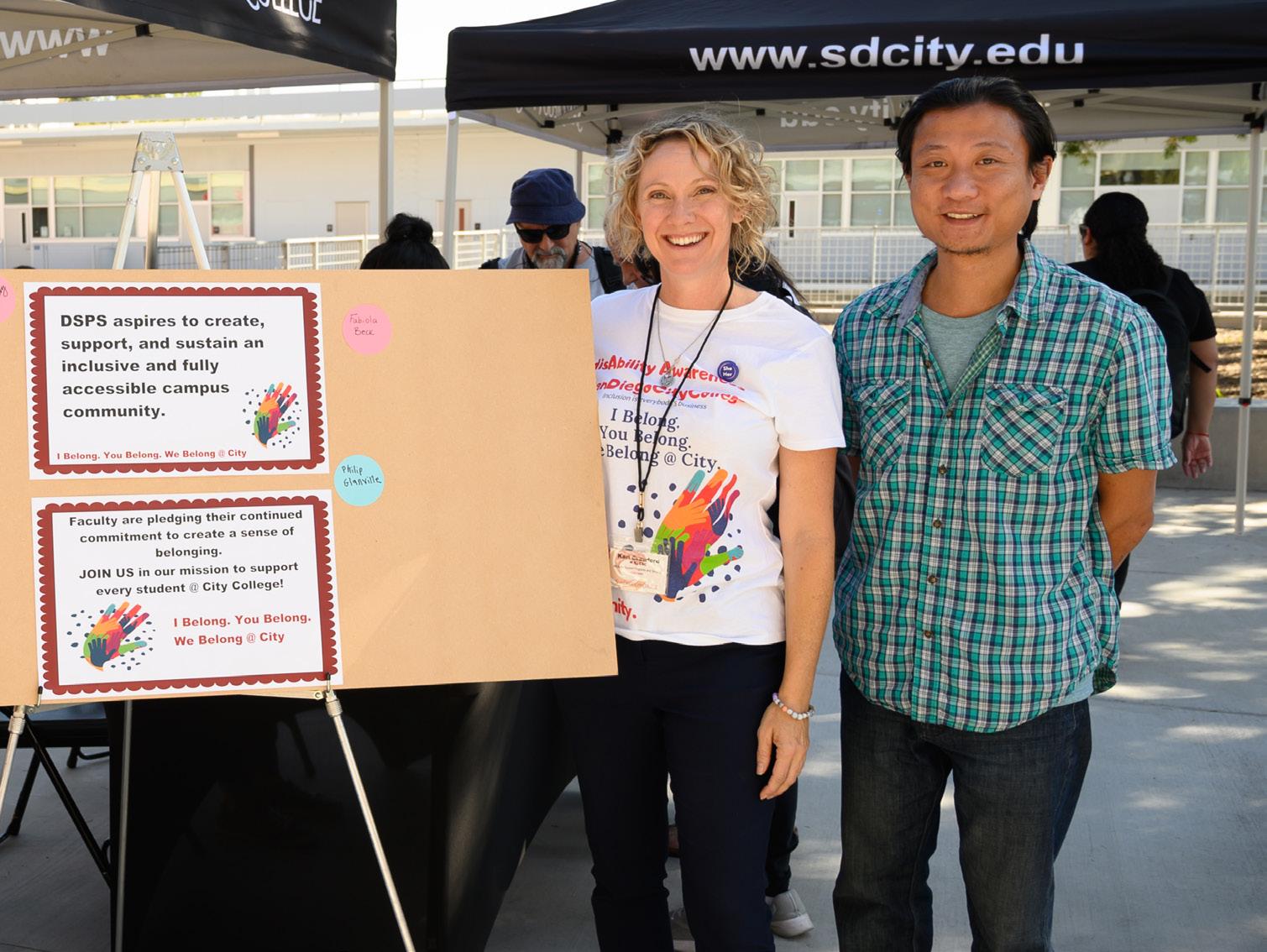
“Prospective students should know that courses need to be accessible,” Gleason said. “I think most faculty are making a good faith effort to do this, but if a student finds that something isn’t accessible, they shouldn’t be shy about asking their professors about it.”
Gleason, who is also a longtime disability rights advocate, said the District has proven to have excellent services for students with disabilities.
“The District does a great job communicating to faculty about what their responsibilities are,” Gleason said. “Students who need accommodations can get them.”

Tucker Grimshaw, an online accessibility mentor for City College, echoed the importance of the program and also expressed his gratitude to the District.
“I am grateful for my time as an online accessibility mentor,” Grimshaw said. “I have learned a lot about accessibility, and I am excited to continue doing so. I like to say that accessibility is a moving target, which shows how important being a lifelong learner is. When we take time to create a curriculum with Universal Design for Learning practices, we can create a curriculum for all students.”
A curriculum available for all students is something important to remember. Fitch said all students and prospective students should know that DSPS is a resource.
“For folks thinking, ‘I want to go to college, but I struggle with X,’ that’s a conversation to have with a DSPS counselor,” Fitch said. “It’s our job to understand barriers and work to remove or circumvent them with our students.”
Due to the District’s work to properly accommodate students with disabilities, students like Natalie Jackson and Vinzent Balaoing see bright futures ahead of them. But, they are just two of the roughly 1,800 to 1,900 students with disabilities that the District serves per semester.
Fitch said one student in particular stands out to her when she thinks about the impact of DSPS.
“I’m thinking about an older student who has experienced a number of health-related delays on their journey to their goal of graduation,” she said.
“For them, the process has been daunting, but DSPS counselors have been tenacious in helping the student make slow and steady progress and will be there to cheer them on this spring when they graduate from San Diego Miramar College!”
Ayoung Sarah Ramos remembers picking moringa leaves while cooking with her aunt every summer in Quezon City, Philippines.
“She absolutely loved to cook for family parties. I was her assistant,” recalled Ramos, 43, who was born in Manila. “She is not with us anymore, but I was so inspired by her. I would come home and cook for my siblings’ birthdays, anything they wanted.”
Although a good cook, Ramos — whose home kitchen was a sanctuary that provided a respite from various stressful HR and administrative office jobs she worked in for nearly 20 years — said her baking skills were a recipe for disappointment.

Today, her talent is quite the opposite of disappointment. Thanks to the knowledge she gleaned while enrolled in San Diego College of Continuing Education’s Culinary Arts program, Ramos is now lead pastry at Addison, which, at the end of 2022, earned its third Michelin star — the only restaurant in Southern California to boast this coveted dining accolade and the only restaurant in America to do so since 2019.
The transformation has been profound. Ramos said that before becoming an elite pastry chef, trying to bake something as simple as a batch of chocolate chip cookies with more taste than what you could find at a grocery store often made her feel like a failure. “I read many cooking books and would borrow books just to learn,” she said.
Her baking prowess was transformed beginning in 2019, when she decided to enroll in the Culinary Arts program at College of Continuing Education, earning a certificate in 2020.
“The fundamentals of French cuisine are a major part of the curriculum. French techniques translate to every culture,” Ramos said. “Once I learned this, it all made sense to me, I started to really understand the chemistry
behind cooking and baking.”
The free Culinary Arts program at College of Continuing Education is a study in success. Students spend 10 months on cooking principles, including sharpening knife skills and learning basic safety and sanitation standards. That’s followed by two more months of advanced-level cuisine preparation, lessons on nutrition and diet plans, molecular gastronomy courses, restaurant operations, and food and beverage management.
The preparation made Ramos a perfect fit for the Carmel Valley restaurant where, for the past 16 years, Executive Chef William Bradley has been refining his craft of contemporary Californian cuisine that the Michelin Guide calls “playful yet polished.”

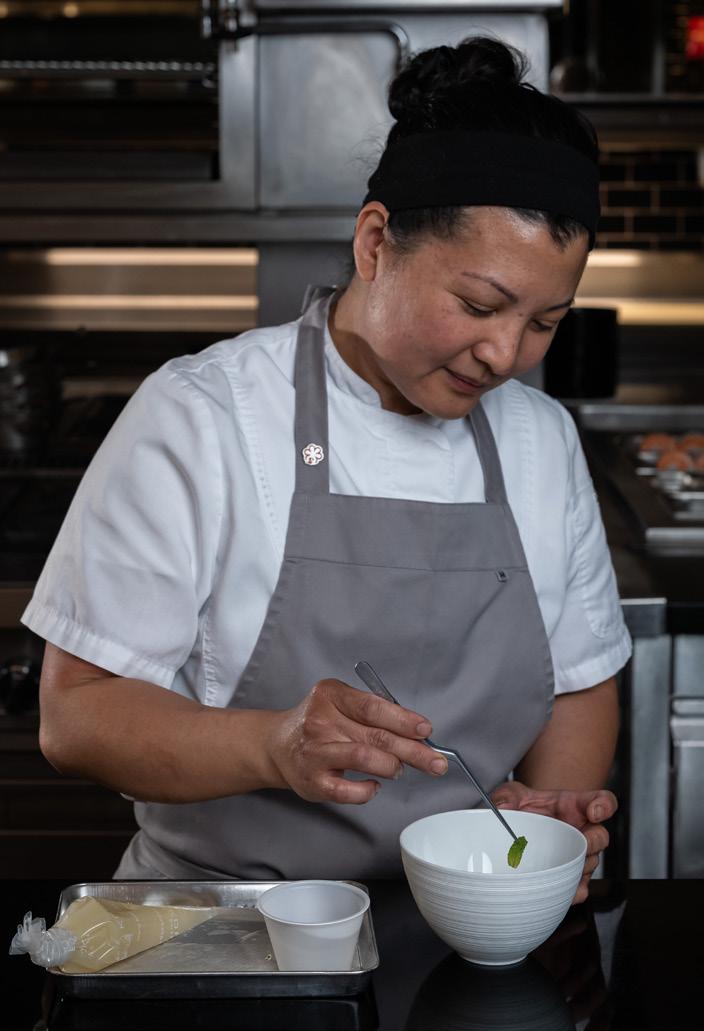
While at College of Continuing Education, Ramos studied under Chef and Associate Professor Megan Leppert, a graduate of Johnson and Wales University and three-time American Culinary Federation Medalist, and Chef and Associate Professor Lee Blackmore, a California Culinary Academy alumnus and Culinary Educator of the Year.
“I have the least experience on the line at Addison, but the College of Continuing Education gave me the confidence to be here,” Ramos said of the kitchen she joined in June 2020. “In fact, I refer to the same book we used in class to do research and development for the restaurant.”
Indeed, under the direction of Chef Bradley, Ramos leads research and development to curate mouth-watering pastries and desserts for the restaurant.
“As soon as Chef Bradley shares his vision, my team and I start testing ingredients to make it happen and bring that dessert to life,” she said.
This process can take weeks before her creations make it on the Addison menu, which aside from their signature items, rotates often.
“Chef Bradley is not afraid to change the menu to provide customers a once-in-alifetime experience.”
The key to success?
“Follow your chef, follow the recipe exactly, collaborate with your team, listen and learn as much as you can.”
After honing baking skills in College of Continuing Education’s Culinary Arts program, alumna trades in office jobs for fine dining(At left) Chef Sarah Ramos delicately places mint atop a mojito-inspired dessert (also pictured at top right and below) inside the kitchen of fine dining restaurant Addison, where she was just promoted to lead pastry. (Above) Chef Ramos layers white chocolate onto the decadent signature Prailine Chocolate Crunch dessert that helped Addison earn its third Michelin star, which is shown plated at right with warm passion fruit mezcal caramel being poured as a finishing touch.
Pumpkin Filling
From her home to yours, Chef Sarah Ramos shares this personal recipe that she says is great for a pie filling, or as a crumble, topped off with maple chantilly.
• 450 g kalabasa (kabocha) squash
• 4 large eggs
• 120 g evaporated milk
• 120 g condensed milk

• 100 g sugar
• 1/2 tsp salt
• 2 Tbsp bourbon
• 1 tsp cinnamon powder
• 1/4 tsp nutmeg powder
• 1 tsp anardana (pomegranate seed) powder [often used in Indian and Persian cuisine]
To prepare the squash, cut it in half lengthwise, remove seeds, place flesh down on a baking sheet and drizzle skin with a neutral oil and season with salt. Bake at 400 degrees for 25 minutes. Once cool, remove the skin and puree the squash along with all other ingredients using a whisk or food processor.
Add the puree to a prepared pie crust or place on its own in a baking dish and top it off with a crumble mixture of equal parts flour, sugar, and butter. Bake at 350 degrees for 45 minutes or until a toothpick comes out clean.


Maple Chantilly (whipped cream)
• 2 cups heavy cream
• 1/4 cup maple syrup
Whip heavy cream until soft peaks form and add maple syrup. Whip again to a stiff peak.
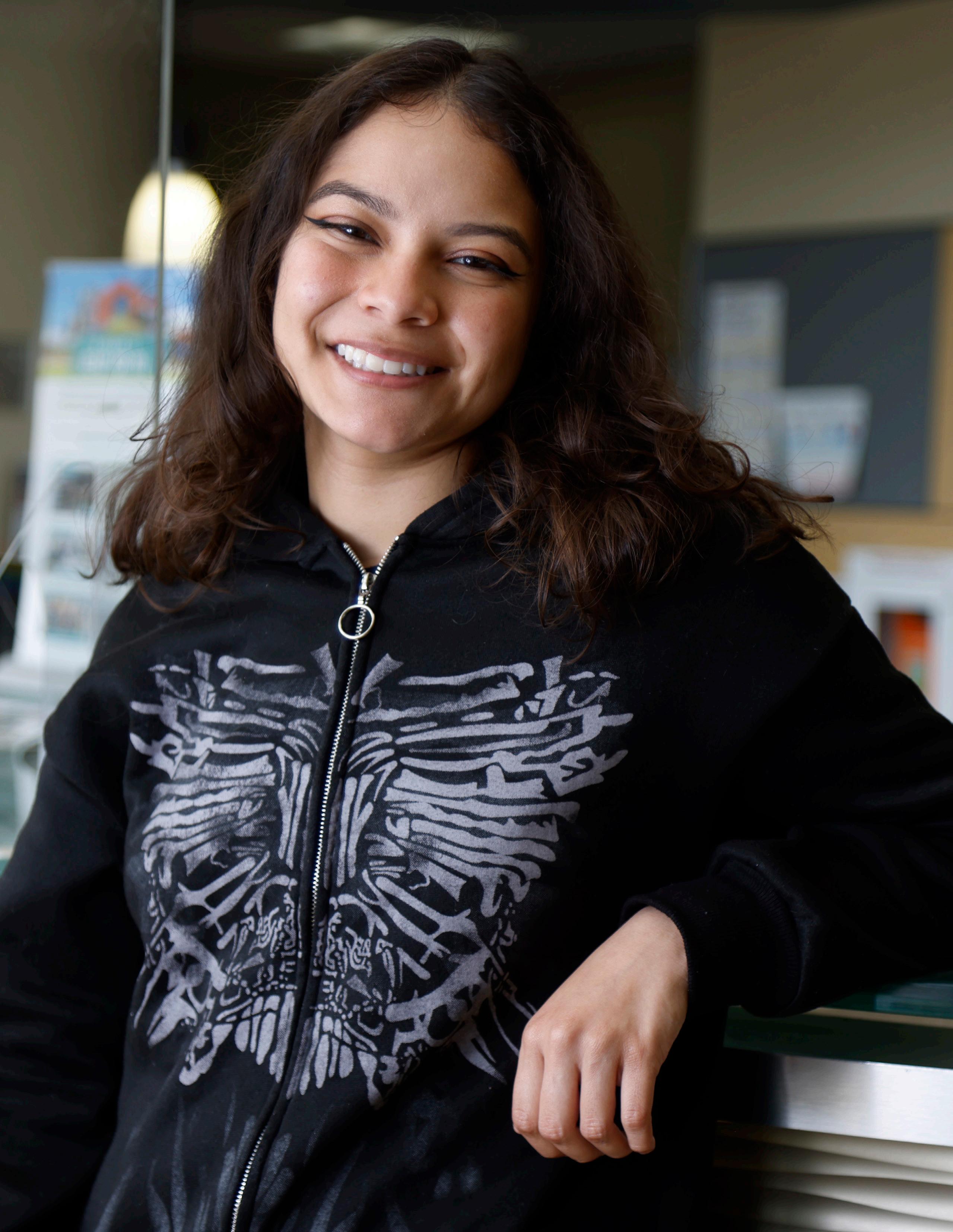 Miramar College student Breanna Hinojosa is a familiar face at the school’s Welcome Center where she is a Peer Mentor.
Miramar College student Breanna Hinojosa is a familiar face at the school’s Welcome Center where she is a Peer Mentor.
Partnership between San Diego Unified School District and San Diego Community College District provides students various avenues to earn college credit before graduating high school
When she was a student at Mira Mesa High School, Breanna Hinojosa wasn’t sure if she would be able to succeed in a college class. Then she heard about the classes that San Diego Miramar College was offering students at her high school — and she decided to give it a try.
“I was kind of hesitant,” Hinojosa said. “I wasn’t a straight-A student, so I didn’t know if I could handle college. I pushed myself and my parents also pushed me and told me I was capable. I gave it a shot and it worked out.”
Hinojosa took two English and two math classes in her senior year at high school, then began attending Miramar College after she graduated in 2020.
“I was thinking about going to Miramar, but taking those classes ensured it,” she said. “I came here because I knew I had a grasp of what the classes will be like.”
Hinojosa, who is now also a Peer Mentor at Miramar College, is one of the thousands of students from the SDCCD who have benefited from a decade-long partnership between the K-12 San Diego Unified School District and the San Diego Community College District. Because of the strong relationship between the two districts, high school students have numerous opportunities to earn college credit even before they graduate from high school.
Amertah Perman, dean of Career Education and Workforce Development at the SDCCD, said every San Diego Unified School District high school offers some way that its students can earn college credit through a partnership with the SDCCD’s credit colleges, San Diego City, Mesa, and Miramar colleges.
“It’s a long-term goal of ours to ensure
that all high school students have an opportunity to graduate with some type of postsecondary certificate,” she said.
Three primary avenues exist for high school students to earn credit from a SDCCD college. One method is through classes that are taught by college faculty on high school campuses through a program known as College and Career Access Pathways (CCAP). Almost 4,000 San Diego Unified School District high school students took CCAP courses in 2022-2023, averaging about 8 to 9 credit units, or three courses, before they graduated.
Although students as young as ninth grade are sometimes able to take college classes, most of the students enrolled are juniors or seniors in high school. The courses are offered for free during the school day, and the classes cover a wide range, from English and math to courses in business, Black studies,
― Genevieve Esguerra, dean of Outreach and Enrollment Services at City CollegeThe ability to offer a college class during the high school time helps to change a student’s perception on what it means to be a college student and what they can achieve.”
2022-2023
2021-2022
2020-2021
2019-2020
2018-2019
political science, health, and many others.
Genevieve Esguerra, dean of Outreach and Enrollment Services at City College, said some high school students, particularly those from families without college graduates, might not have considered attending college.
“Sometimes the idea of going to college is not even on their radar,” Esguerra said. “The ability to offer a college class during the high school time helps to change a student’s perception on what it means to be a college student and what they can achieve.”
At the most recent Joint Board Meeting in March at the Logan Memorial Educational Complex, it was revealed that in their first year as college students at City, Mesa, or Miramar, former CCAP students had higher success rates in
their first year as college students (77% of enrollments earning a passing grade) than first-time students who did not participate in CCAP ( 69%). Additionally, students are shown to earn more units (16.8 vs. 11.3), are more likely to persist to a second year of college (66% vs. 50%), and are more likely to earn a degree for transfer (11% vs. 3%).
An additional 2,900 high school students in the 2021-2022 school year were able to receive college credit for career education courses they took in high school by passing a college-level exam. Almost a third of those students enrolled at City, Mesa, or Miramar college after they graduated from high school.
The courses eligible for college credit focus on career pathways that align
the high school and college courses, said Sarah Vielma, director of the College, Career, and Technical Education department at San Diego Unified School District. High school teachers work with college faculty to review the courses in fields as diverse as health, culinary arts, or digital photography so that students who pass an exam can earn college credit.
More than 1,000 students took advantage of a third option allowing high school students to enroll in courses at the colleges. About 86% of those students were successful in their courses.
To encourage students to consider college in their future, SDCCD representatives are reaching out to San Diego Unified School District students as young as 1st- and 2nd-graders, said Luke Menchaca, dean
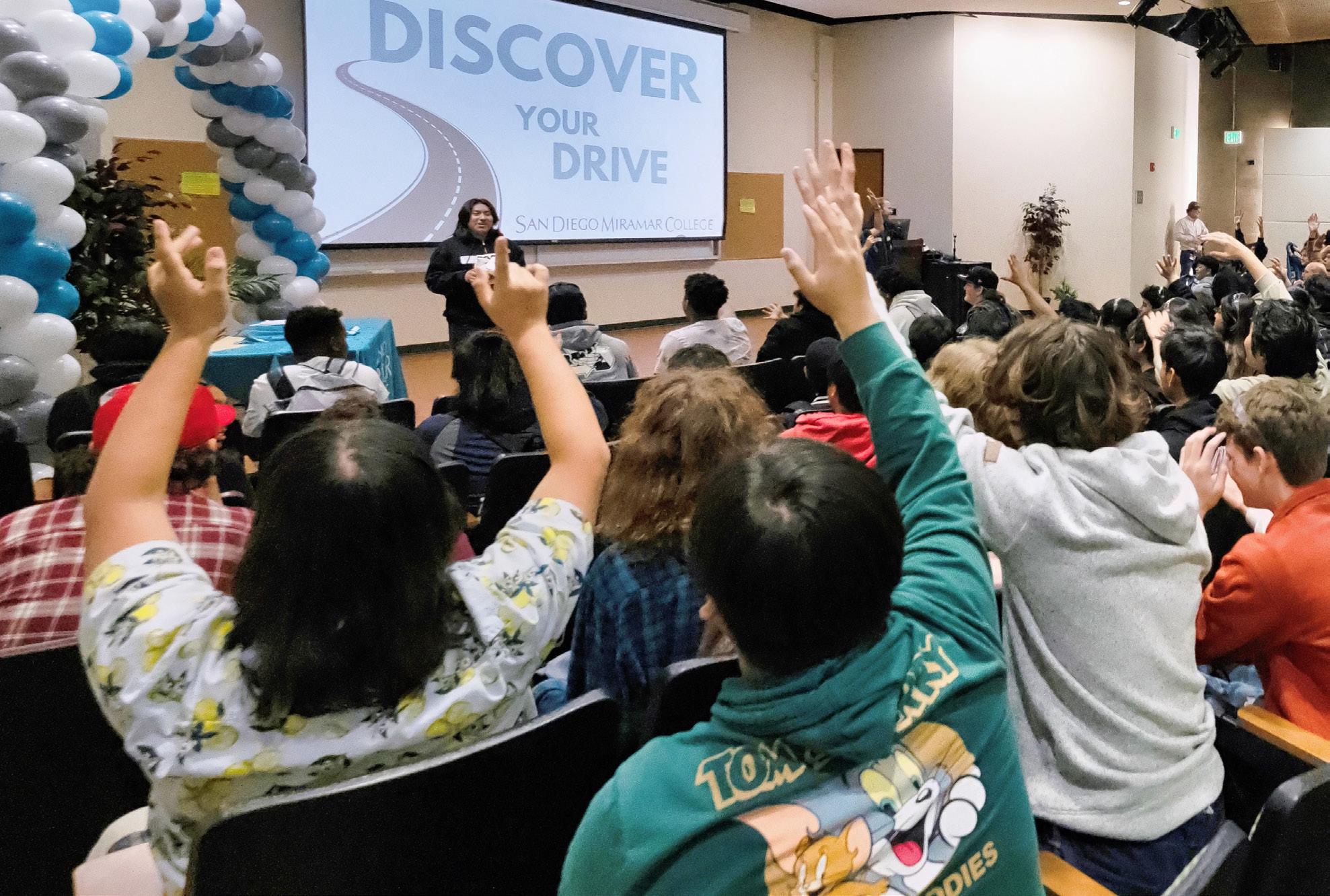
of Outreach and Student Affairs.
“It doesn’t just happen after they graduate from high school. We’re connecting with them at an early age,” he said. “We’re invested in them so we want to continue that investment, and that investment impacts the community.”
Some students had not considered college for financial reasons, so an important part of outreach efforts is informing them about the San Diego Promise program, which offers two years of free tuition, as well as assistance with book costs and other programs, at the SDCCD’s credit colleges. At the start of the 2022-2023 academic year, the Promise program reached a new enrollment record with 2,349 students — and 1,076 of those students came from San Diego Unified School
District schools.
Perman said the benefits to students are possible because of the close collaboration between the two districts. The efforts begin at the governing board level, where the two boards meet annually to set goals, and the partnership is strengthened with regular meetings between college and high school leaders to hammer out the details.
The original intent of
the joint venture was to increase the number of underrepresented students in higher education, but the agreement has expanded so that all students benefit, said Jennifer Roberson, senior director of the Office of Graduation at San Diego Unified School District.
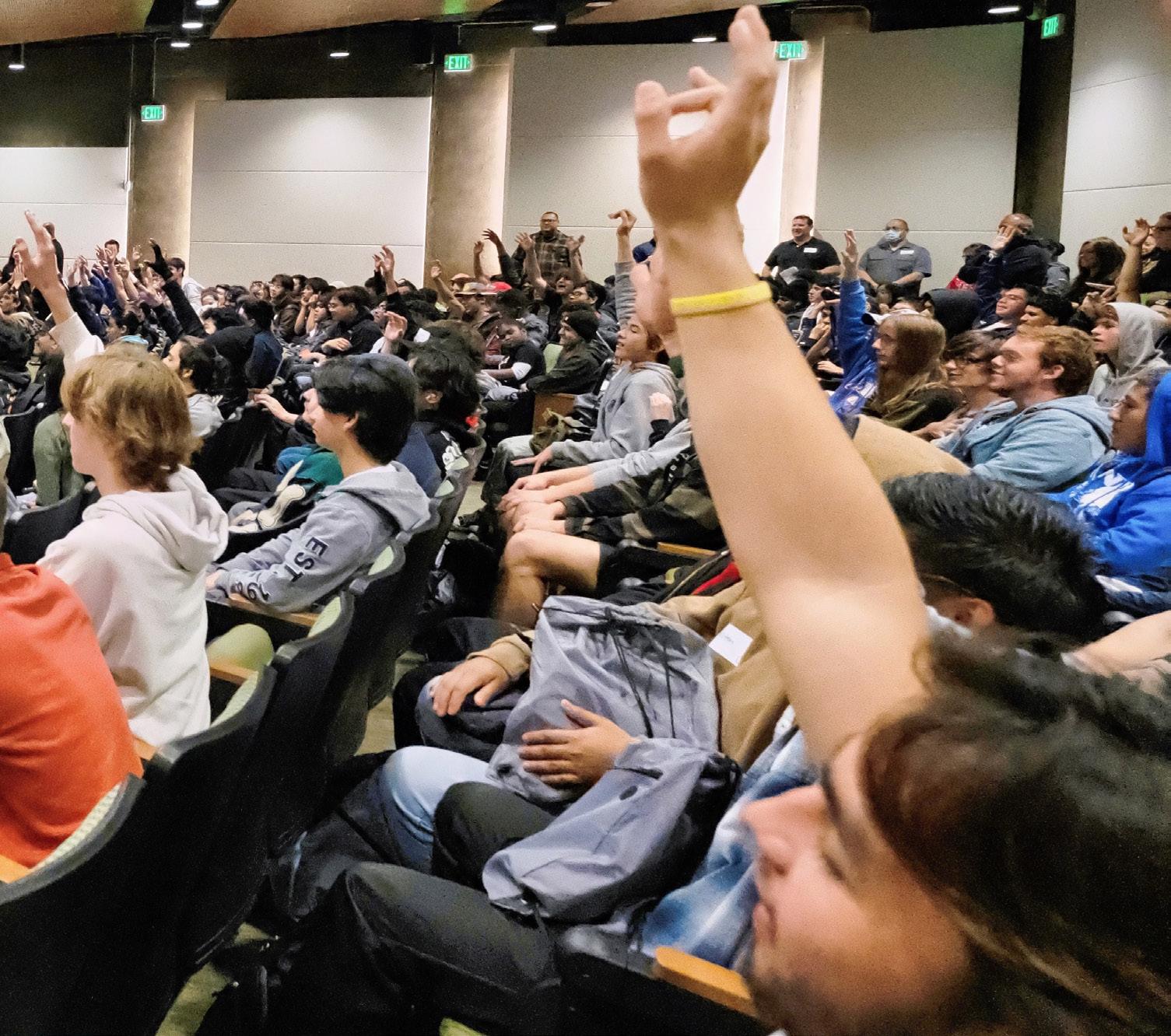
“It really is a partnership,” Roberson said. “Jointly, we have created a seamless process for
In February, more than 300 San Diego Unified School District students participated in two Discover Series outreach events (pictured at left) at Miramar College that provided opportunities to meet with current faculty and take part in hands-on program demonstrations.
Read more on page 24
Breanna Hinojosa, who enrolled in college classes while still attending Mira Mesa High School, is now a Peer Mentor at Miramar College where she offers tips to other students on how to successfully navigate their education journey.

students to enroll in courses and have ongoing goals and metrics for increasing access and enrollment.”
The logistics of coordinating high school and college classes can be complex, but the reward of having students realize they can succeed in college courses make the effort worthwhile, said Sonny Nguyen, dean of Enrollment Services at Miramar College.
“It’s quite the process, but ultimately it does benefit students,” he said. “We’re giving students the opportunity to access college classes.”
The college classes that Hinojosa took when she was in high school gave her more confidence when she began attending Miramar College. She’s planning to transfer to a four-year university to pursue a psychology degree, with a career goal of working as a mental health counselor. She said she would encourage any high school student who is considering taking a college class to do so.
“Try something new even if you think you won’t be capable of doing it,” she said. “It can be hard, but challenging yourself can bring out the best in you.”
It’s alarming but true: A significant number of community college students face food insecurity. To combat this issue, San Diego City College has taken another step in its initiative to keep those on campus from going hungry.

According to the California Community Colleges, 50% of students who responded to the recent #RealCollege Survey said that they had experienced food insecurity in the last 30 days. Twelve percent of students said they had to skip eating for an entire day because they couldn’t afford a meal.
Whether they don’t know where their next meal is coming from or have difficulty finding the funds to purchase nutritious food, students at City College can turn to the Knights’ Table, the campus’ revamped food distribution space, for a helping hand.
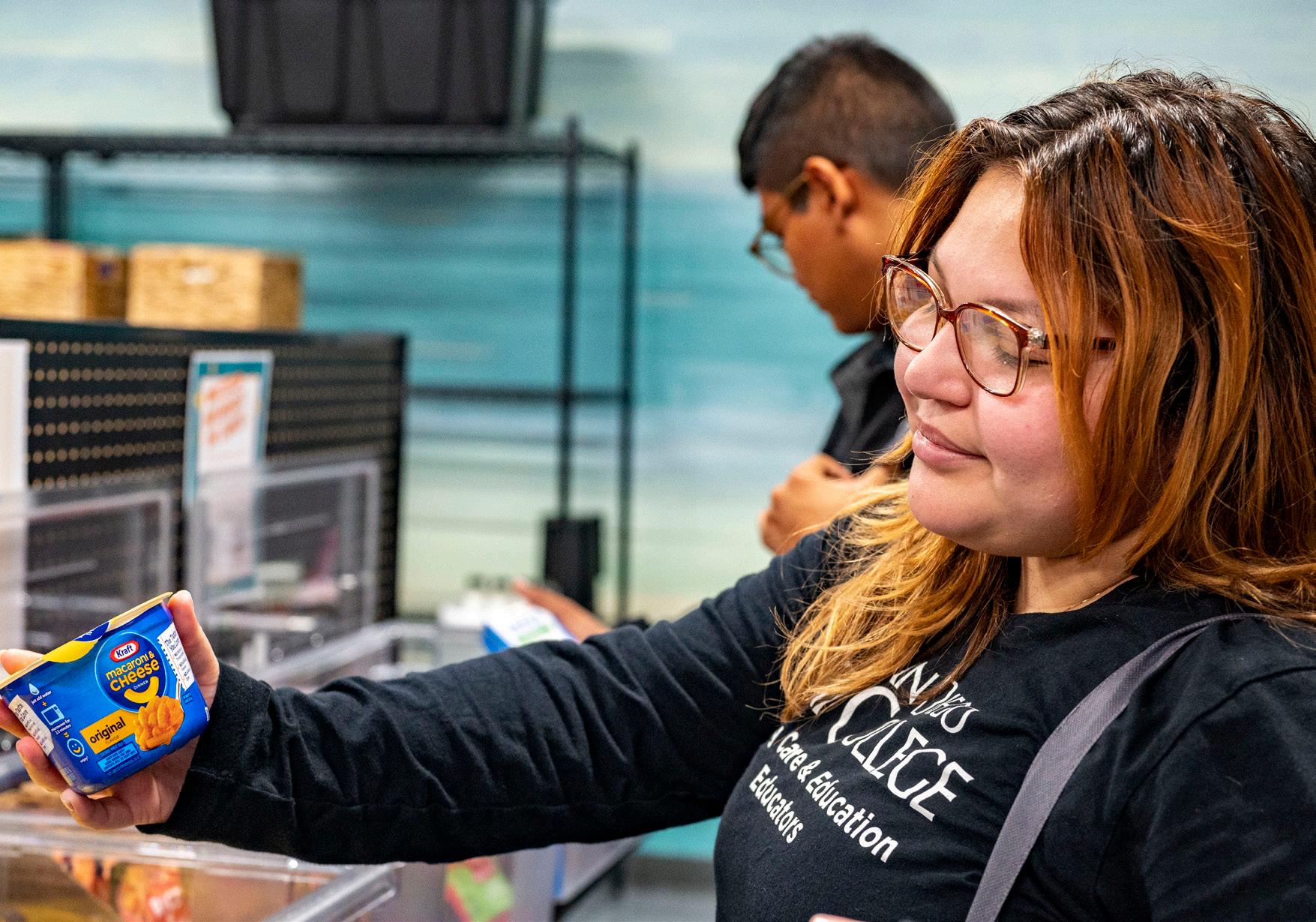
The Knights’ Table food pantry had a soft opening in November and a formal ribbon cutting in February. The new Knights’ Table, expanded from its original space, is one option among a host of services — food, housing referrals and, soon, clothing and other basic needs — available to help students who find themselves in a bind to stay on track.
“The umbrella of basic needs is going to get bigger and bigger,” said Adan Sanchez, dean of Student Affairs. Knights’ Table, located in T-150, is “set up like a grocery store,” not a food pantry, said new City College Basic Needs Coordinator Nydia Dominguez. Various sections are available to browse for everything from ready-to-eat meals, snacks, coffee and other drinks, to canned food, produce, and some refrigerated items such as milk and milk alternatives and yogurt.
“It does feel like you’re shopping and not just getting food,” Dominguez said.
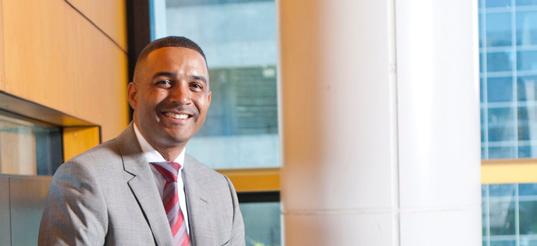
Those who helped shape the Knights’ Table wanted it to appear “open and friendly and welcoming,” as Dominguez said. In part, Sanchez hoped to ease the “stigma of asking for help” that some students cited as an impediment to using programs like the pantry. Students, once registered, can access the Knights’
Table from 10 a.m. to 2 p.m. Monday through Thursday with just a scan of their campus IDs. It’s designed, to be a “really simple process,” Dominguez said.
But part of that registration, filling out a basic-needs assessment, has been telling. Students often are facing more than just food insecurity, Dominguez said. Housing costs in an expensive market, such as San Diego, have become an increasing burden, and expense aside, some students also are dealing with a crisis — violence, for instance — that has forced them from home.
So, raising awareness of the Knights’ Table among the campus community may serve as a way to reach students in need of other interventions. City College leadership is using many tools, from social media to campus posters and announcements sent via the Canvas online hub, to promote the revamped space. As a result, traffic there is on the rise, just as basic-needs services continue to expand.
“It’s really an opportunity for students to have access to food, on a daily basis if needed … and that’s just the beginning of it,” Sanchez said.

It’s no secret that the San Diego Mesa College athletics program is widely known as one of the best in Southern California, with more than 19 men’s and women’s sports that earn multiple titles each year.
With an average GPA over 3.5, student-athletes at Mesa College are the pinnacle of success. So much so, that Mesa College has been awarded the Devore Trophy — which is presented each year to the Pacific Coast Athletics Conference (PCAC) program with the most successful men’s and women’s intercollegiate athletic program — three times since 2012.
This year, Mesa College
football is setting a new college record with players receiving 122 offers (as of April 12, 2023) to continue. In 2022, Mesa College athletes received more than $2.4 million in scholarships, with seven All State Scholar Athletes who earned 3.5 GPA or higher, and in 2021, Mesa College had 13 Scholar-Athlete Awards. Multiple players earned stand-out distinctions, including Ezra Christensen and Antwoine Sullivan, who accepted offers to Fresno State; Gunnar Gray and Blaze Zito, who will transfer to Buffalo; and Cameron Stoffel, Ethan Nelson, and Donovan Warren, who will attend Gannon Uni-
versity. For comparison, in 2019, Mesa College had 20 sophomores who received 87 total offers, and all 20 accepted a scholarship offer. On average, Mesa College football players receive 70 offers each year.

Going Pro
In addition to current athletes, Mesa College football coaches and former players are making headlines, as well. Over the winter, Head Coach Gary Watkins Jr. was selected to serve as the tight ends coach for the United States Football League Michigan Panthers. Watkins will return to Mesa College in the early summer with additional

knowledge that he hopes to be able to incorporate into the Mesa College football program.
“I am grateful for the opportunity to work with Coach Mike Nolan and the Michigan Panthers,” Watkins said. “It’s a dream come true to coach professional football. I’m excited to learn and grow as a coach during my time with the Panthers.”
After this year’s National Football League season concluded, the Houston Texans hired San Francisco 49ers defensive quality control coach, former football player, and Mesa College alumnus Stephen Adegoke as its new safeties coach. Adegoke was only in his first season with the NFL when he was selected, serving previously as a graduate assistant on the University of Michigan’s staff under Jim Harbaugh before going to the 49ers. Before Michigan, Adegoke coached with Florida from 2019-2020, where he was working on his master’s degree in sports management, which he completed in 2021.
Adegoke played college football as a safety for Mississippi State from 2017-2018 after transferring from Mesa College. Adegoke played 16 games while with Mississippi State and totaled 14 career tackles, an interception, two pass breakups, and a forced fumble.


More than 300 students from the San Diego Unified School District descended on San Diego Miramar College during February for the return of the college’s popular Discover Series.
For the first time since 2019, Miramar College was able to host these popular outreach events thanks to the return of in-person events, which were halted during the COVID-19 pandemic.
The first event, Discover Your Drive, was held on February 9, and was followed a few days later by the Discover Your Passion event on February 13. These two events introduced high school students to the Career Training Education classes offered at Miramar College. A total of 340 students attended.
Discover Your Drive drew 215 students interested in three areas of study: auto, aviation, and diesel technology. Students received hands-on opportunities to meet with current faculty and take part in program demonstrations.

Baker Cook, a senior from Clairemont High School, volunteered to taxi an aircraft for take-off at Montgomery Field as part of the flight simulator demonstration offered by Aviation Faculty Member Josh Birnbaum.
“It’s been really awesome,” said Cook. “I decided to come today to try to understand what jobs are available and what I might get paid doing these types of jobs.”
Josh Birnbaum, who teaches Aviation 101 Private Pilot Ground School and its concurrent lab, which features 12 flight training devices, said: “I saw a lot of great reaction from the students that came through here. It’s something I wish I got when I was in high school. I started in this program that I am currently teaching. I just fell in love flying, so much that I left my career at Apple after 12
years to pursue teaching here at Miramar College.”
Auto students were able to get under the chassis of some half-dozen cars, while students visiting the Diesel Technology department took turns operating a backhoe provided by Hawthorne-Cat. Penske brought in two trucks for inspection, one gas-powered and the other electric-powered. Solar Turbine had an information table at the event and representatives from the Alaska Airlines talent acquisitions team were present to meet with students.
“We’re very excited to bring this series of events back after the pandemic,” said Claudia Estrada-Howell, associate dean of Career Education at Miramar College. “The intent of the Miramar College Discover Series is to strengthen the College’s K-14 CTE pathways by exposing students to the college’s Career Training Education.”
During the Discover Your Passion event, where 125 students were in attendance, the focus was on the college’s Business and Entrepreneurship, Paralegal, and Child Development programs.
Discover Your Passion attendees visited the Regional Entrepreneurship Center (REC) Innovation Lab, were shown how to start a new business, and participated in a pitch presentation. At the Child Development Center, students learned through play at four different stations, including painting and manipulatives. Paralegal Department faculty showed students how to identify legal issues by reviewing childhood storylines such as “The Three Little Pigs” and “Sleeping Beauty.” The Business Department shared with students strategies on how to construct a sales message, while representatives from the Financial Services Department played a game called Financial Football, in honor of the recent Super Bowl.
It’s all about the kids. That’s the mantra at San Diego College of Continuing Education’s Child Development program, where the curriculum covers infancy through adolescence and everything in between. Students learn about the social, emotional, physical, and cognitive development of children at various stages of life as they prepare for new careers in an in-demand profession.
“This is where you really develop your experience in different age groups,” said Associate Professor Stacy Surwilo. “What a 1-year-old toddler needs is completely different from what a 3-month-old baby needs.”
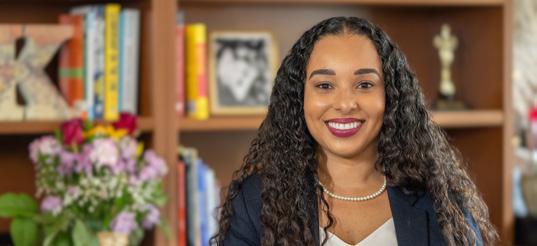
The Child Development program at College of Continuing Education is a career education pathway designed for adult learners. Classes are offered on campus, online, and in a hybrid format. Select Child Development certificates are eligible for college credit through credit by exam and count toward an associate degree at San Diego City, Mesa, or Miramar colleges.

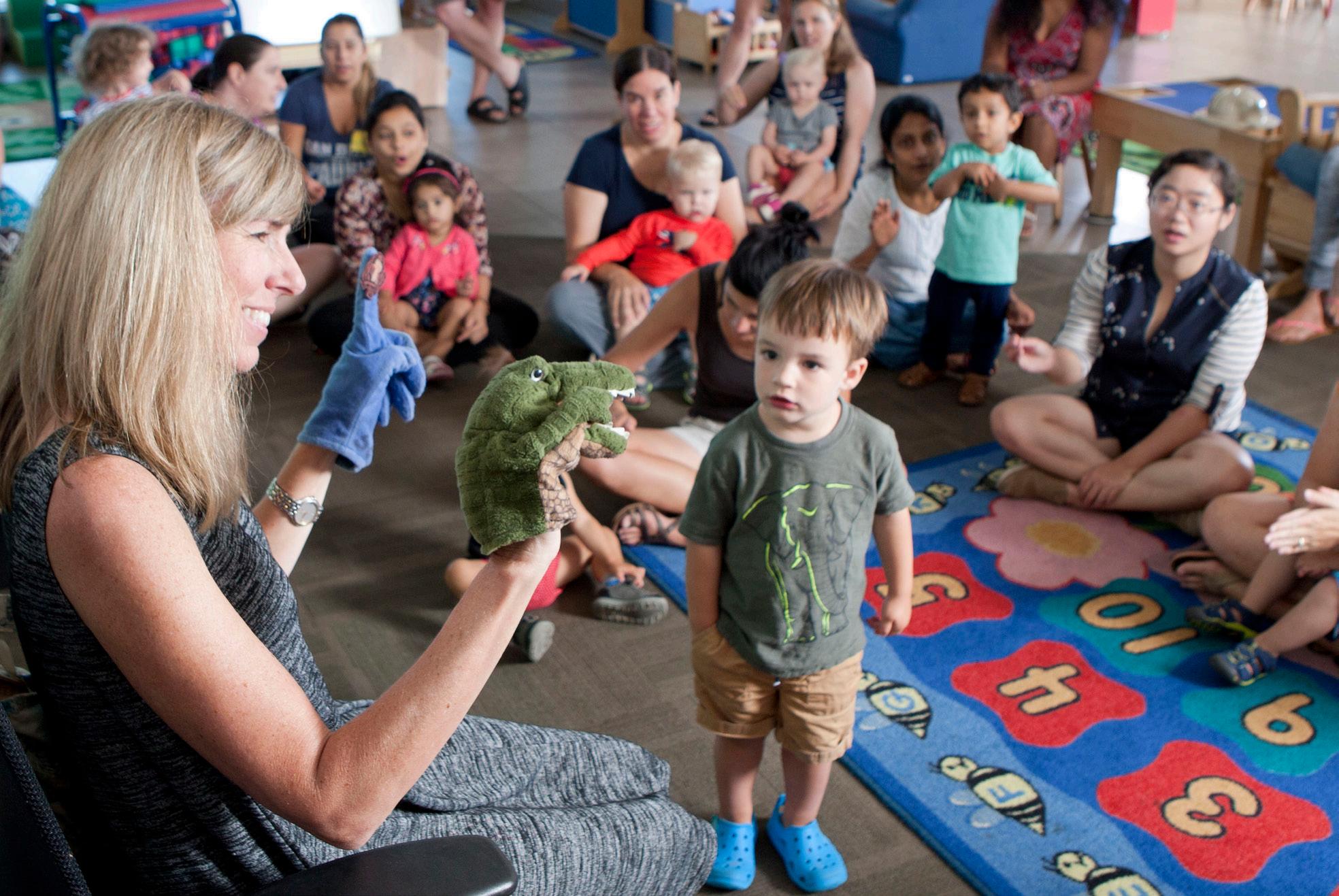
Nine tuition-free certificate programs are offered at College of Continuing Education’s Child Development program: Child Care Provider; Infant Care Specialist; Child Home Care; Infant & Toddler Development; Early Learner Development; Infant & Toddler Enrichment; Early Learner Enrichment; School-Age Care & Leadership; and 3- to 5-Year-Old Specialty Curriculum. While certificate programs prepare graduates for careers in early childhood education and after-school programs, select classes include opportunities for parents to learn with their children in developing effective parenting techniques.
The one-to-one ratio and parent involvement are key differentiators at College of Continuing Education. Every child in the class has a parent or caregiver attending to them. “An average daycare might have five children to every adult, and a preschool might have up to 12 students for every one teacher,” Surwilo said.
Child Development student Lannette Sugihara enjoys
the safe and inclusive space College of Continuing Education provides students while having her child learn and socialize alongside her. She first enrolled in the Early Learner Development and Care program in 2015 with her first-born daughter. After seeing the developmental impact it made during her daughter’s kindergarten year, she enrolled again, this time in the 3- to 5-Year-Old Specialty Curriculum, with her second child in 2022. “There is a lot of learning with incredible professors. As a new mom, you can psychologically feel alone,” Sugihara said. “In this class we are sharing the same experiences and we are a part of a community. Once my kids are older, I would consider a career in preschool addressing children’s social-emotional growth I learned at College of Continuing Education.”
Indoor and outdoor learning labs are located at four College of Continuing Education campuses, including the César E. Chávez Campus in the heart of Barrio Logan, West City Campus in the Midway District, Mesa College, and Miramar College. Each campus comes with a specialized playground, a community garden, and imaginitive learning environment that promotes literacy, science, technology, engineering, and mathematics. Offsite locations offer the same courses at Park de la Cruz in City Heights and the Harold J. Ballard Parent Center in Old Town.
Before enrolling at San Diego City College, 18-year-old first-generation, first-year communication studies student Maximus Gastelum did not believe higher education was for him. During his senior year at Morse High School, his grades were not up to par to apply for a university. Instead, he was preparing to join the workforce.
“I didn’t think I was going to make it because of my surroundings,” he said. “Coming from southeast San Diego, I grew up in low-income housing and didn’t have anyone to look up to who could help me navigate college. It was either sports, work, or gangs in my neighborhood, and I chose sports.”
QDescribe your experience at City College?
ACity College has been so nice to me. Ever since Signing Days at my high school, I have had an amazing experience. My life has truly changed for the better once I committed to this amazing college. Not only the college itself, but the people here have truly been influential in my experience here at City. My favorite part was being able to invite my family to the Scholarship Banquet. I feel like I am at the right place at the right time.
QWhat does Umoja mean to you and what is your involvement with the club?
AUmoja is big at City College; it means a lot to a lot of people. For me personally, Umoja is more than a program, it is a culture, it is a family, and it is love. Growing up in southeastern San Diego, I have always embraced Black and African-American culture. I like that we learn through an African lens.
Q What is it like being an Outreach Ambassador? A
My dad told me I won the lottery, because I earned the scholarship and became an Outreach Ambassador right out of high school. As an ambassador, I have the opportunity to return to my high school and many other high schools in San Diego to share my story with other students like me.
Gastelum, whose family is from Jalpa, Zacatecas and Ensenada, Baja California, was among one of 10 local high school students who earned the 2022 Jim and Jan Sinegal Presidential Scholarship, which provides $2,500 toward tuition and a MacBook.
“Achieving this scholarship not only supports me but also my family,” he said. “My mom and dad are very proud.”
Now in his second semester at City College, Gastelum works as an Outreach Ambassador and is the vice president of the Umoja program.

WE recently spoke with Gastelum about his first-year experience and goals for the future.
QWhat advice would you give high school students?
AMy advice for others would be to maintain a balance between your education and your personal life. You cannot obtain your success without both aspects of your life working in unison.
QWhere do you want to transfer to after City College?
A I graduate in spring 2024. My first choice would be to transfer to UC Berkeley in the fall followed by UC Los Angeles, UC Santa Barbara, or UC Davis.
QWhat are your career goals?
AI just know I want a career that allows me to use my voice to help in a bigger way. If it is through being involved in the educational system, coming back to San Diego City College, or even just working someplace where people need to be heard on a bigger stage.

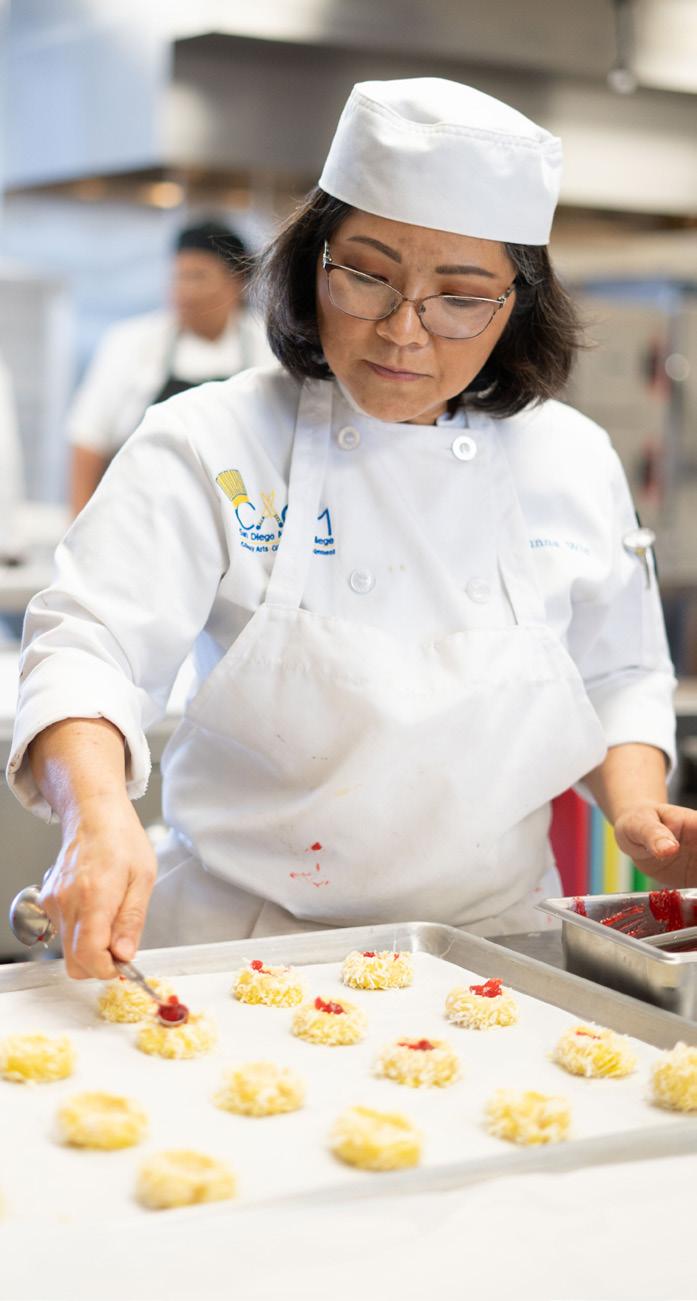


3375 Camino del Rio South San Diego, CA 92108-3883
sdccd.edu
Follow us on Facebook, Twitter, YouTube, and Instagram!
facebook.com/sdccd twitter.com/sdccd youtube.com/TheSDCCD instagram.com/thesdccd


The San Diego Community College District Communications and Public Relations team is seeking your feedback.
Do you read our With Excellence (WE) magazine frequently? Is this your first time seeing the magazine?
Either way, we would like you to share with us what you enjoy about the publication and where we might have room to grow.